

The 9th Asian Winter Games is being held in Harbin, capital city of Northeast China's Heilongjiang province from Feb 7 to 14.
Over 1,200 athletes from 34 countries and regions across Asia compete in the Games, making this edition the largest in terms of participating delegations and athletes.
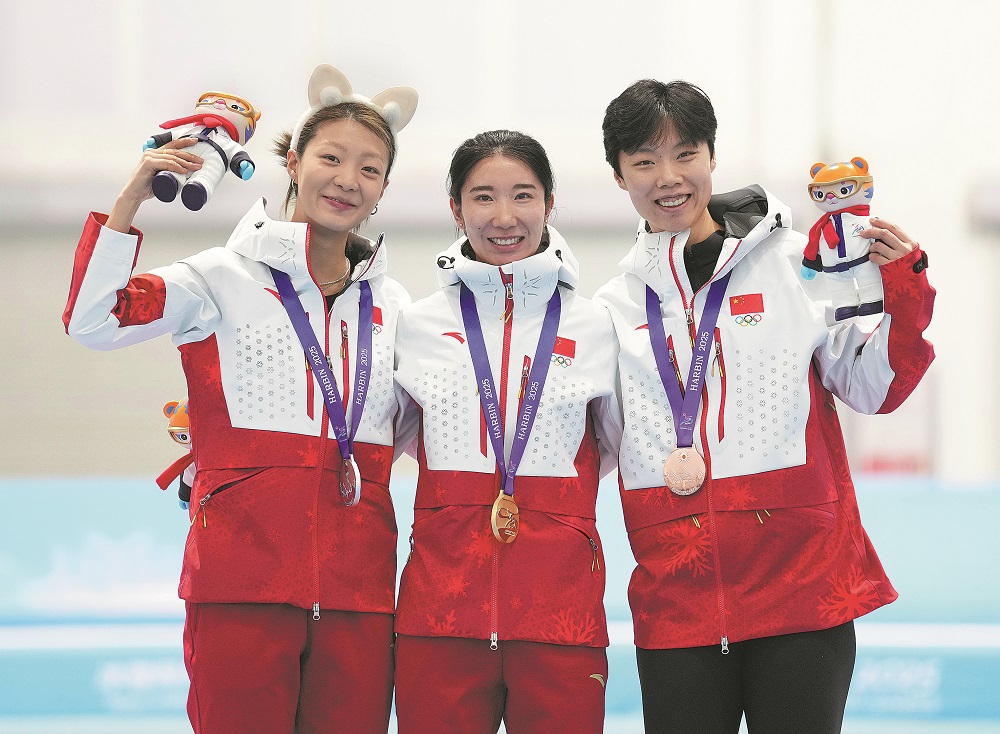
The Korean White Tigers roared on the short-track, while the host tapped its squad's deep talent to reign supreme over distance, capping a dramatic opening day of skating at the Asian Winter Games in Harbin.
Day 1 of skating finals at the Games has underlined the world-class prowess of the Republic of Korea in short-track speed skating, while celebrating an equally fruitful campaign for the host delegation in speed skating at the long-track oval just across the street.
So eager to get the entire delegation off to a flying start, China's short-track speed skating squad unfortunately left a capacity crowd at the Heilongjiang Ice Training Center deflated on Saturday morning, after star skater Lin Xiaojun's accidental fall with one lap to go in the 2,000m mixed relay Final A cost the host its commanding lead and allowed the Koreans to come from behind to win the first gold of the Harbin Games.
The mighty ROK contingent, known as the White Tigers on the rebranded ISU World Tour, carried that momentum forward to collect three more golds in the men's and women's 1,500m and the women's 500m, convincingly proving its elite status at the top of the physically contested sport.
Hot fan favorite Lin, who met enthusiastic fans chanting his name wherever he appeared on Saturday, redeemed himself by staying composed throughout a chaotic men's 500m final — the race had to be restarted twice due to collision penalties — to offer some solace to the home fans with a gold.
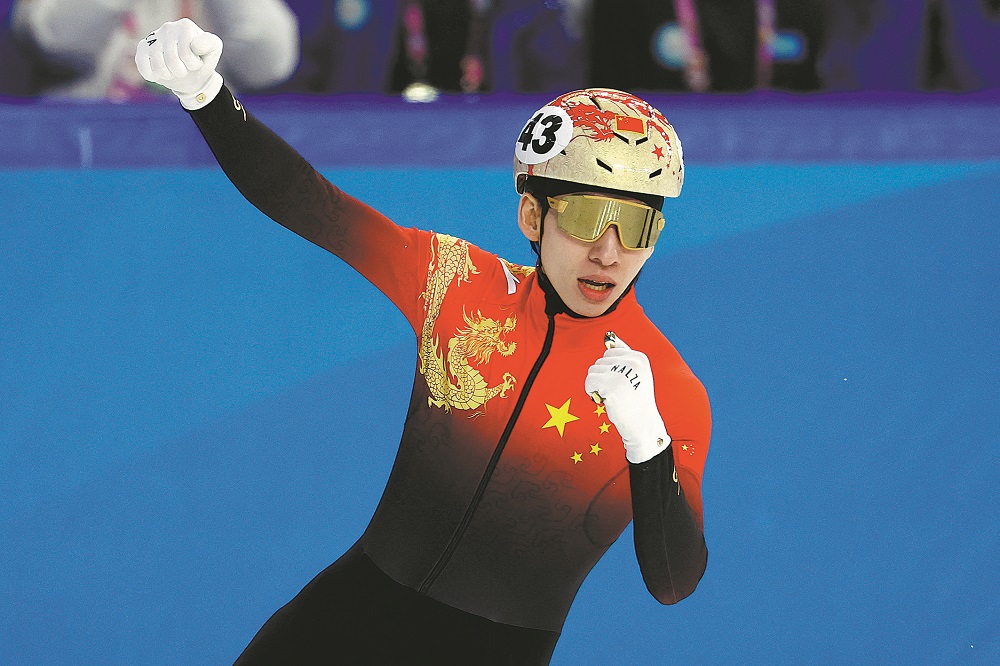
Lin refused all interview requests from media, despite his individual gold, leaving the arena in apparent disappointment.
Although falling far behind their Korean opponents on the first day of action, Chinese skaters have put on a brave face and are opting to push ahead with a positive mindset in their remaining events.
"Of course we comforted and encouraged each other (after the mixed relay). We are a team and we always stick together," said women's distance specialist Zang Yize, who won bronze in the 1,500m.
"We won't put ourselves under huge pressure, or stay frustrated, though. We still have more individual and team events to contest.
"We will focus on the next race, get up when we fall and try to push for better results with confidence," said the 25-year-old Harbin native.
Gong Li, China's silver medalist in the women's 1,500m, admitted that the opening blow of losing the mixed relay did have an impact, but she's content with the resilience she showed to be mentally refreshed for her individual race.
"While there was certainly disappointment, it didn't dampen our momentum," said Gong, who skated second leg in the relay. "Thanks to our years of experience, we understand how to mentally adjust after any race, ensuring we're ready to face whatever comes next."
Unexpectedly, yet encouragingly, the host's speed skaters came out flying on the long track at the oval on the other side of the ice sports center, bagging three out of the four gold medals on offer on Saturday.
Reigning 500m Olympic champion Gao Tingyu proved his strength in the sprint events by storming to a fast first-place finish in just 9.35 sec against ROK veteran Kim Jun-ho in the men's 100m final, claiming the first gold up for grabs on the speed skating program.

Gao's mark in the dash event — a special ultra-short distance only contested at the Asiad — broke the previous Asian record set by Japanese skater Yuya Oikawa at the 2007 Changchun Games by more than two seconds.
Kazakhstan's Yevgeniy Koshkin finished second, trailing Gao by a mere 0.12 sec, while Gao's rival Kim had to settle for the bronze medal.
Later at the oval, which is staging the Winter Asiad for the second time after hosting the 1996 edition, Chinese speedsters capped off a near-perfect day with a double delight in the 1,500m, after world champion Ning Zhongyan secured a solid win by dominating the men's final with a Games record of 1:45.85, before Han Mei finished ahead of the pack in 1:57.58 in the women's final.
Han's compatriots Yang Binyu and Yin Qi followed in second and third place, respectively, to complete a podium sweep, drawing rousing cheers and applause from the partisan crowd.
"Every member of our team performed well today, and I feel so proud that three of our national flags were raised on the podium at the same time," said Han, a two-time silver medalist at the all-round world championships.
A Harbin native who's spent over 10 years training at the competition oval, Ning said he was over the moon after etching his name in the history of the venue.
"Before the race, I said that my goal is to break the competition record, and, today, I really did it. I've managed to put a Chinese name in the record books, and I'm very proud and very happy," he said.
In the bronze medal match of the mixed doubles curling, the host pair of Han Yu and Wang Zhiyu denied the underdog Filipino duo from winning the Southeast Asian country's first medal at a Winter Asiad.
The Chinese pair rallied from four ends down to beat Kathleen Dubberstein and Marc Pfister 6-5 to clinch the host delegation's first medal of the Games.
"I love and feed on the pressure. This is my first time competing at an event of this size, and I'm very grateful to represent the Philippines," Dubberstein said of her Games debut in Harbin.
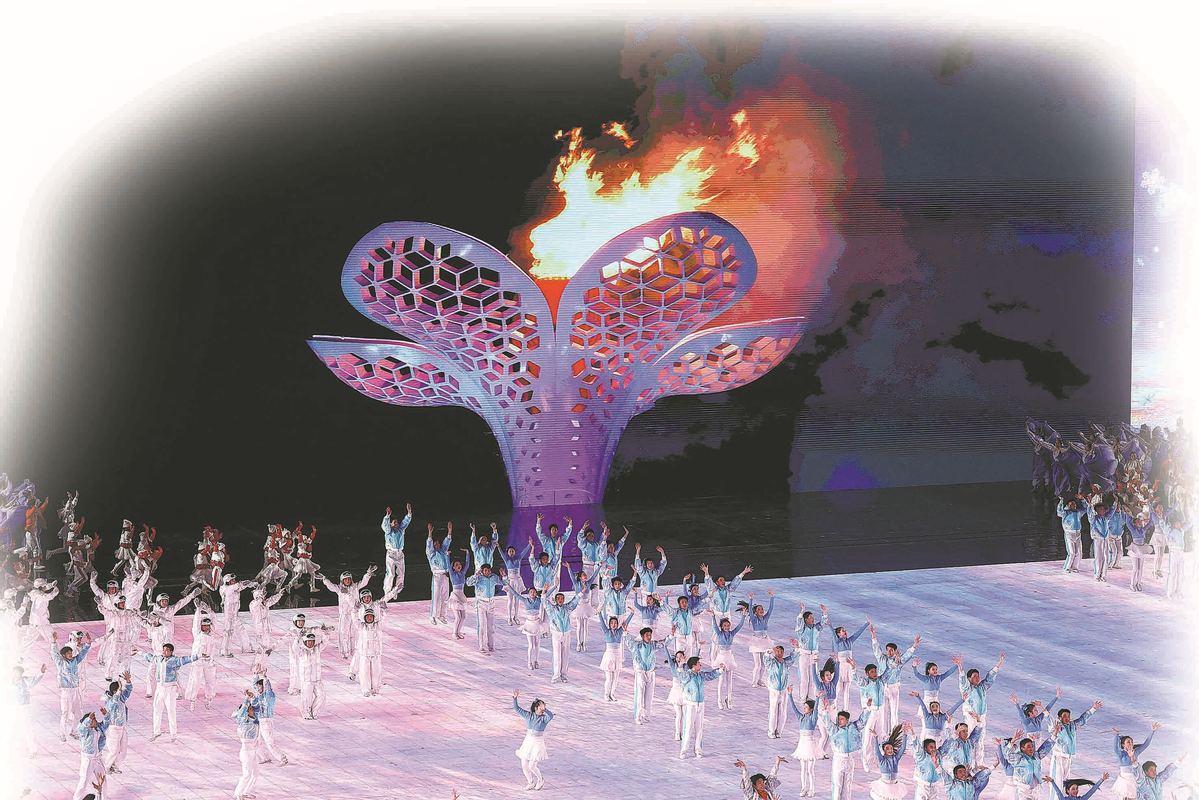
The highly anticipated opening ceremony of the Asian Winter Games was short, but spectacular.
The weather was extremely cold, but everyone involved felt the warmth and passion.
"It created a unique contrast by placing the lighting ceremony at the world's largest ice and snow theme park, allowing the audience to feel warmth and vigor in the midst of the ice and snow," Zhou Wei, deputy director of the ceremonies and events department of the Games' organizing committee said at a news conference that followed the opening ceremony on Friday.
The design of the cauldron, in the shape of a blooming lilac flower, was selected from 32 design proposals and was completed by a team from the Academy of Arts and Design at Tsinghua University.
"They drew inspiration from Harbin's city flower," said Zhou. "Based on Harbin's spirit and ice and snow culture, the design team integrated the curves of the resilient and elegant lilac flower with the pure and peaceful symbolism of the snowflake, reflecting the city's open and inclusive embrace."
The flame burns at the center of a giant snowflake Ferris wheel, symbolizing "Love among Asia", echoing the "Dream of Winter" conveyed by the torch relay and perfectly interpreting the theme of the Games.
"The moment the giant snowflake Ferris wheel radiated with fire and fireworks erupted outward, it produced an enduring image of the ceremony," said Zhou. "This winter, the Harbin Ice and Snow World was specially designed with representative buildings from various countries and regions in Asia, fully embodying the Games' theme."
The performance venue for the opening and closing ceremonies — the Harbin International Conference, Exhibition and Sports Center — is an existing venue that was renovated and upgraded to meet the needs of the two events.
"The opening ceremony stage incorporates multiple functions, such as a performance area and flag stand, creating a good viewing experience in a limited space, fully embodying simplicity without being plain, and grandeur without being extravagant," said Zhou.

Performers selected
The selection process for the performers at the opening and closing ceremonies began in September.
After a systematic and thorough selection process, nearly 3,000 performers were chosen from four art troupes, 10 universities, and five children's institutions in the province.
Through multiple rounds of auditions, about 1,000 performers were finally selected and rehearsals began in November.
"The opening ceremony fully embodies the collective power of Harbin's residents," said Zhou. "In addition to college student volunteers, people from all sectors of society actively participated in the preparation work for the opening ceremony, contributing their efforts," said Zhou. "The combination of professional performers and the general public reflects the participation of the whole nation in the grand event."
The opening ceremony integrated Harbin's profound cultural characteristics with ice and snow sports, and thematic elements of the Asian Winter Games.
"The representative folk songs, dances, musical instruments and intangible cultural heritage projects showcased the unique charm of the country's northern landscapes and vividly interpreted the belief that ice and snow can be treasures," said Zhou.
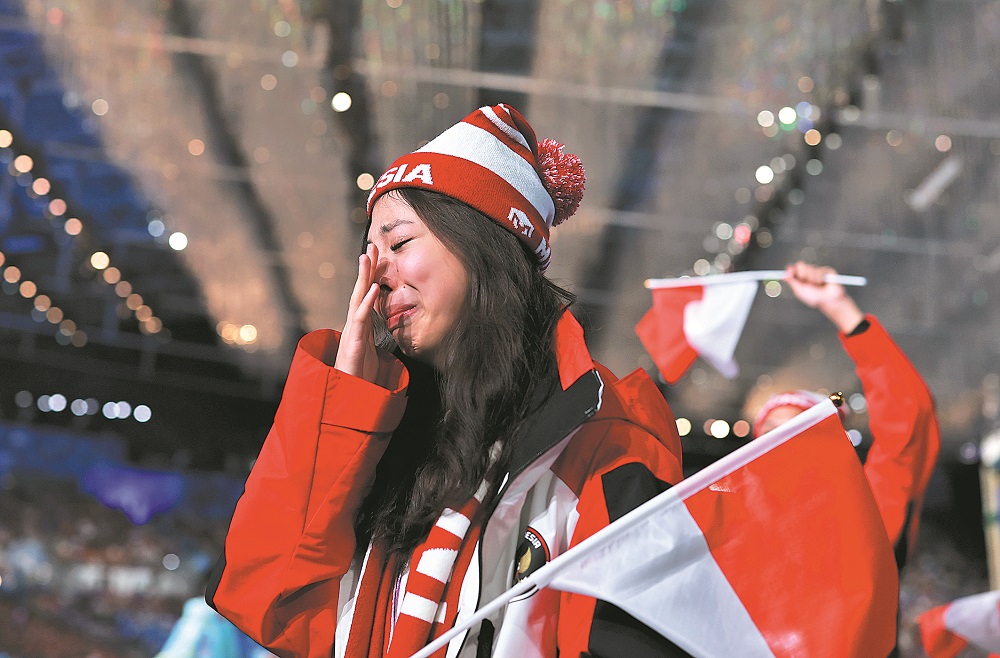
Ice and snow elements
Harbin is well known for its ice and snow, but the directorial team transformed the extreme cold into artistic beauty and unleashed the fiery passion of sports, according to Sha Xiaolan, chief director of the opening and closing ceremonies of the Games.
"We arrived in Harbin half a year ago and conducted in-depth on-site research," said Sha, who was also the mastermind behind the highly acclaimed ceremonies at the 2023 summer edition of the Games in Hangzhou. "Almost every part of the program featured elements of Harbin, starting from the welcome ceremony."
"The opening with the ice lanterns stirred childhood memories, as ice lanterns are familiar to every Harbin resident, along with square paper-cutting and the ice harvesting chant," he said. "The rhythm of the second program transitioned into a graceful ballet, with two Olympic champions embarking on a path to chase their dreams alongside the children."
"The performance venue was originally an exhibition center, so it couldn't support hanging equipment from above, and the floor couldn't accommodate underfloor spaces or the installation of mechanical devices for elevation," said Sha.
"Therefore, we had to give up aerial performances and ground elevation. We designed a highly dynamic screen to display the backgrounds, glasses-free 3D images and stage designs."
"At the moment when the flame was lit, almost everyone's eyes were filled with tears," said Sha. "It presented a perfect performance. In the end, we embraced each other, shouting 'complete success'," he said.
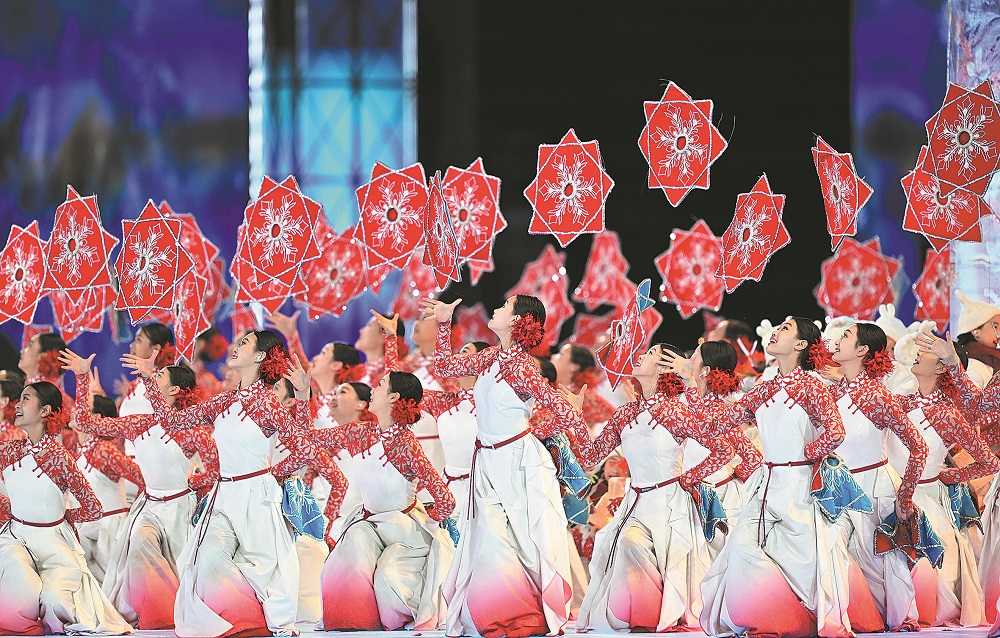
Sui Wenjing, who won the pairs figure skating gold medal at the 2022 Beijing Winter Olympic Games, became a member of the directorial team at the Harbin event.
"After the 2022 Beijing Winter Olympic Games, I enrolled in the Beijing Dance Academy to study choreography and directing, aspiring to become a director," said Sui.
"The experience of this opening ceremony has greatly encouraged me, because the innovative fusion made me believe that figure skating can be experimental and presented in more scenarios."
"In the future, I hope to continue creating more works using figure skating as a medium," she said. "Whether at large-scale events or within my professional field, I aim to diversify the platforms upon which figure skating is performed, and spread more Chinese culture."
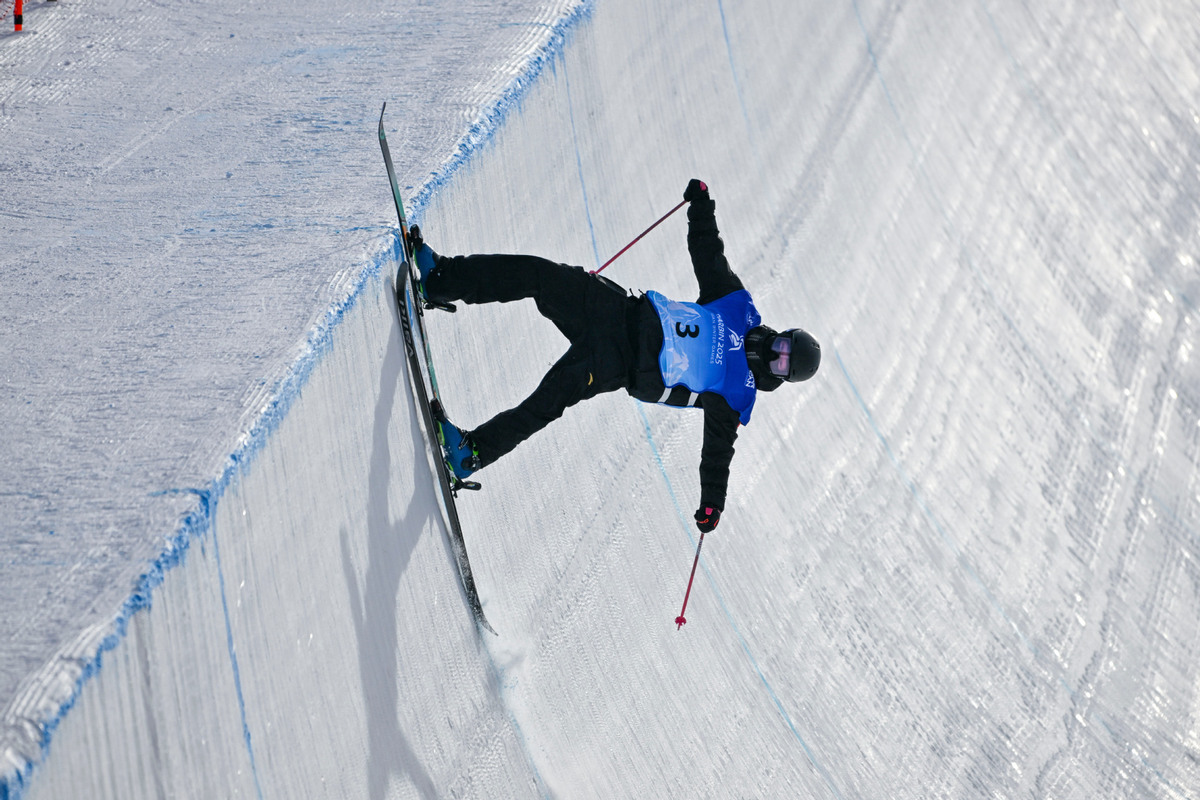
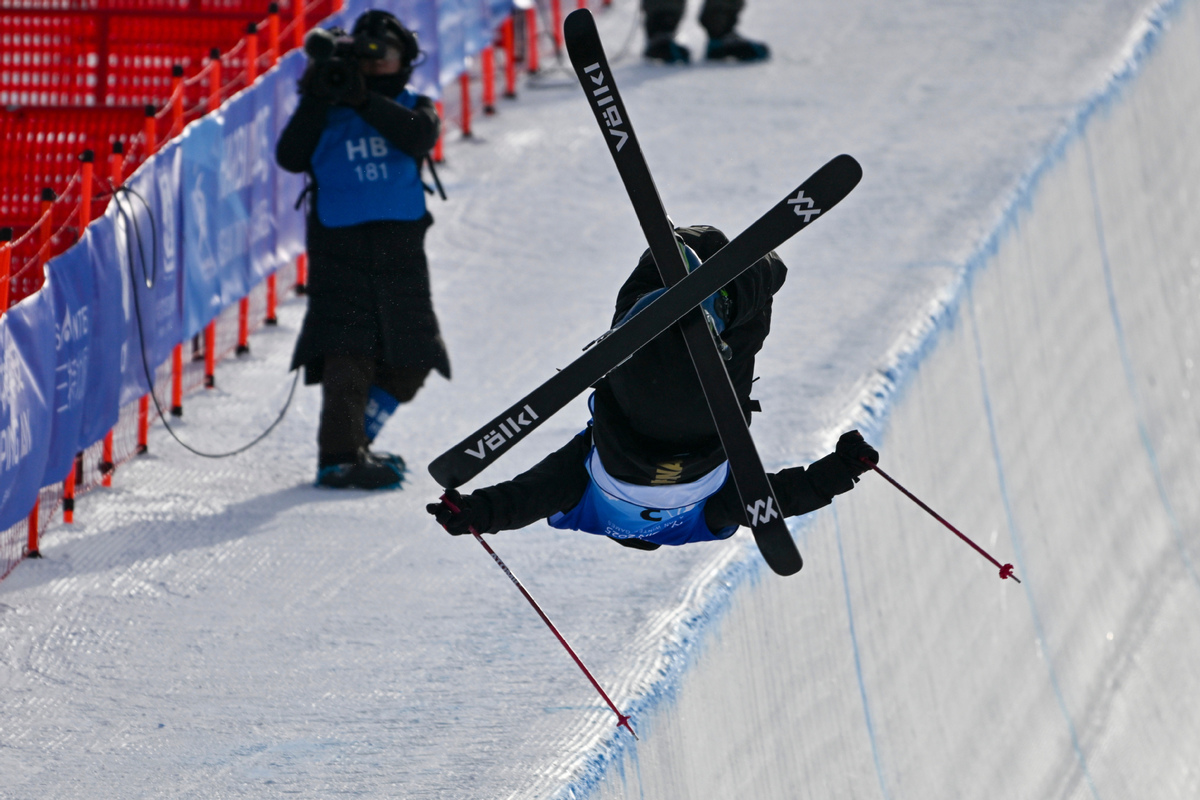
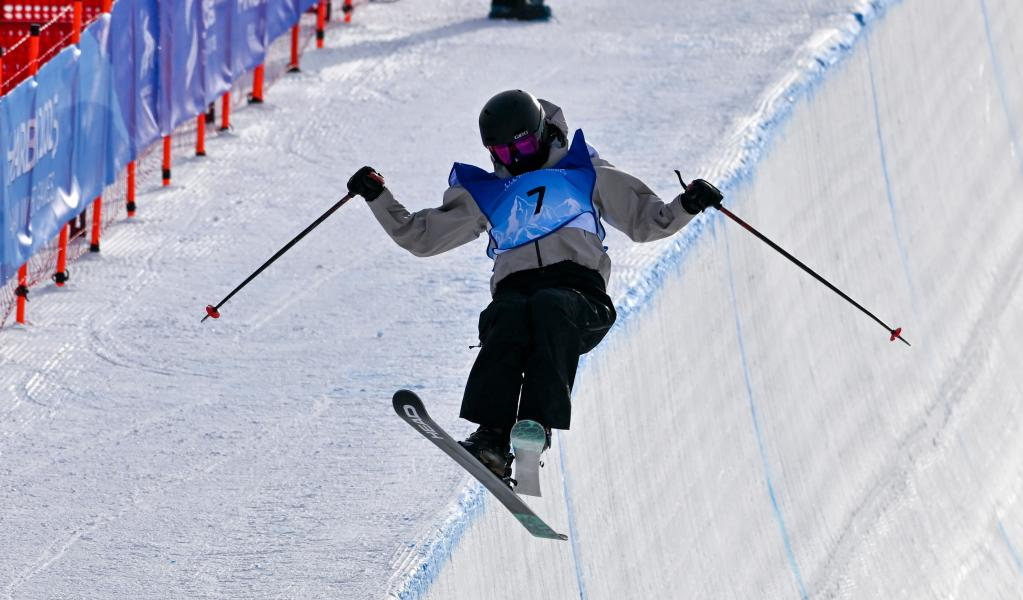
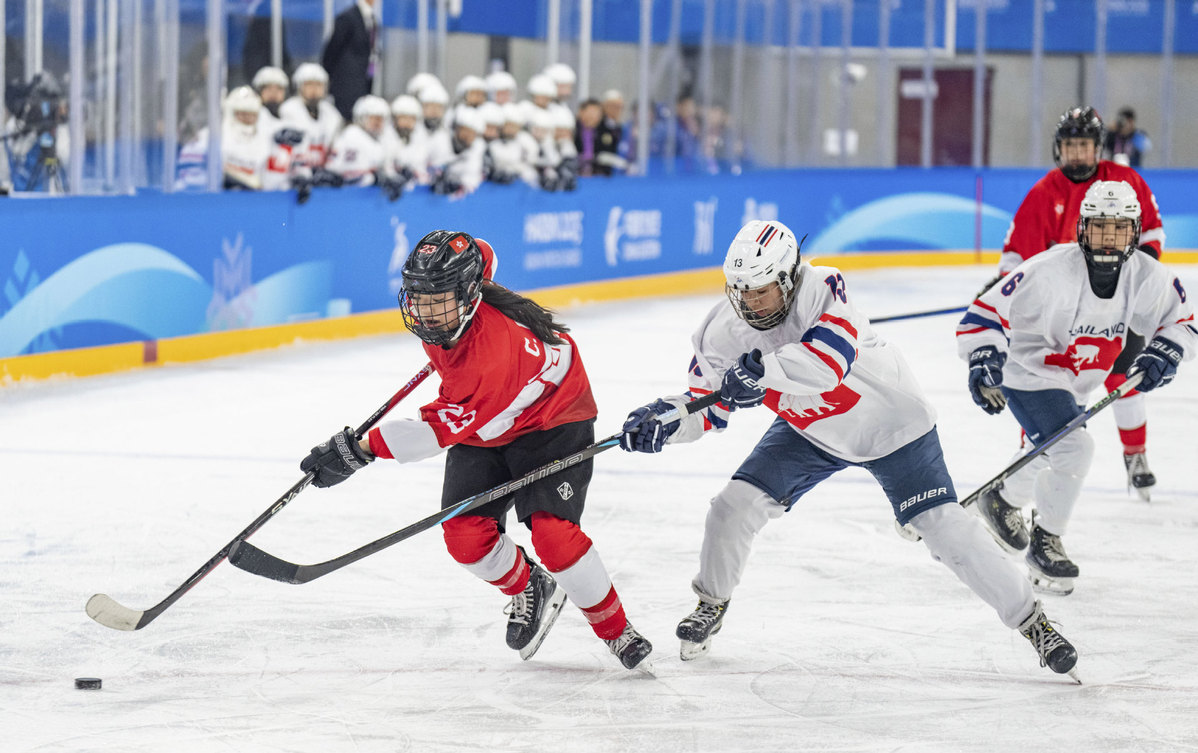
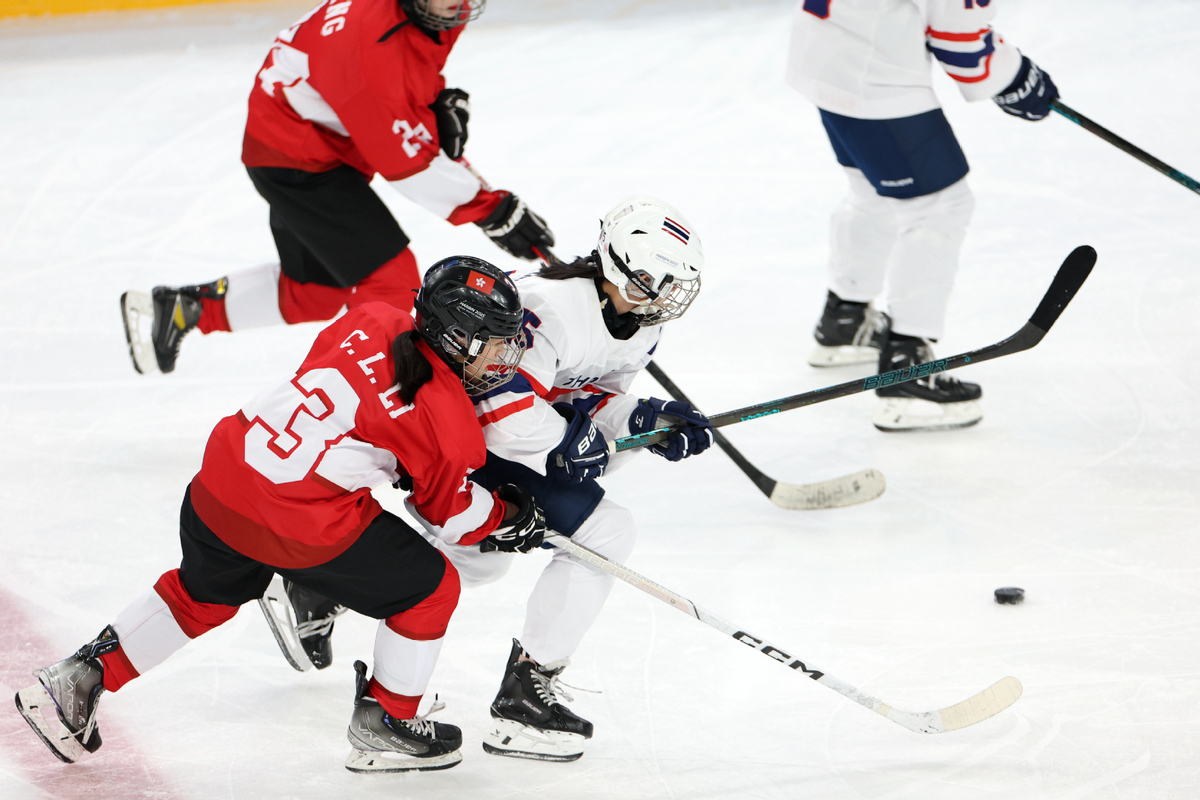

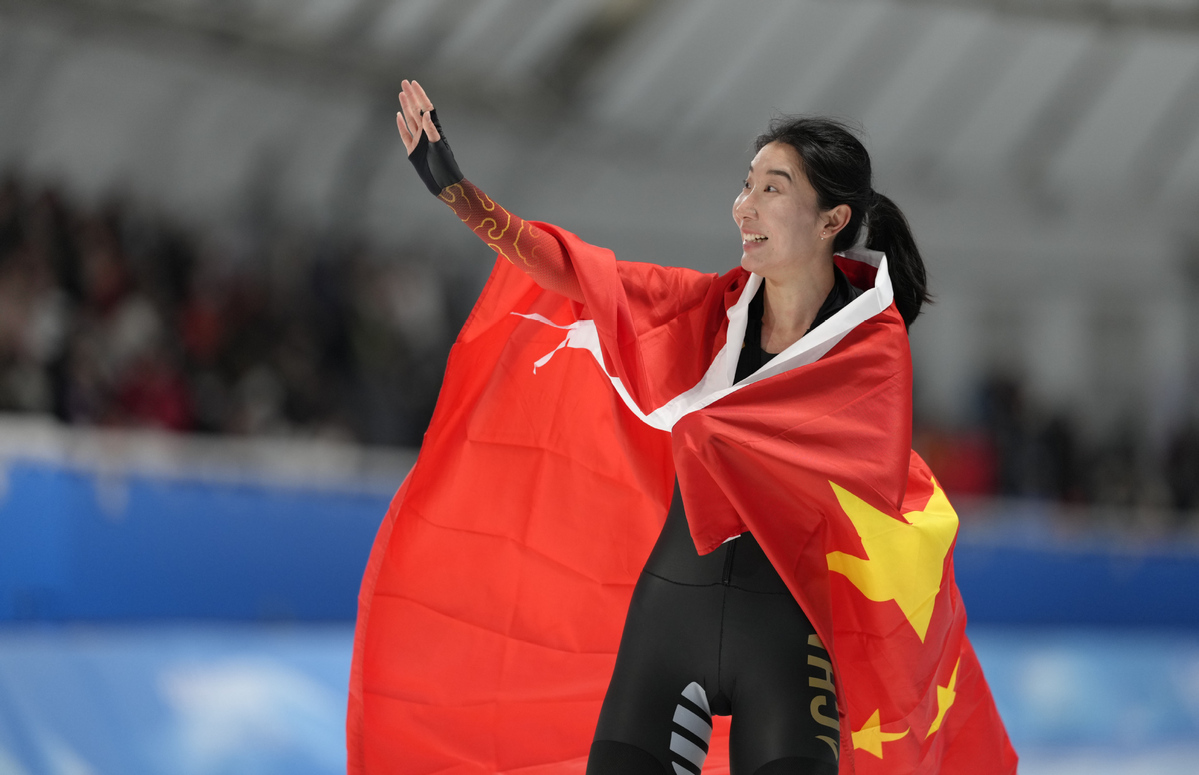
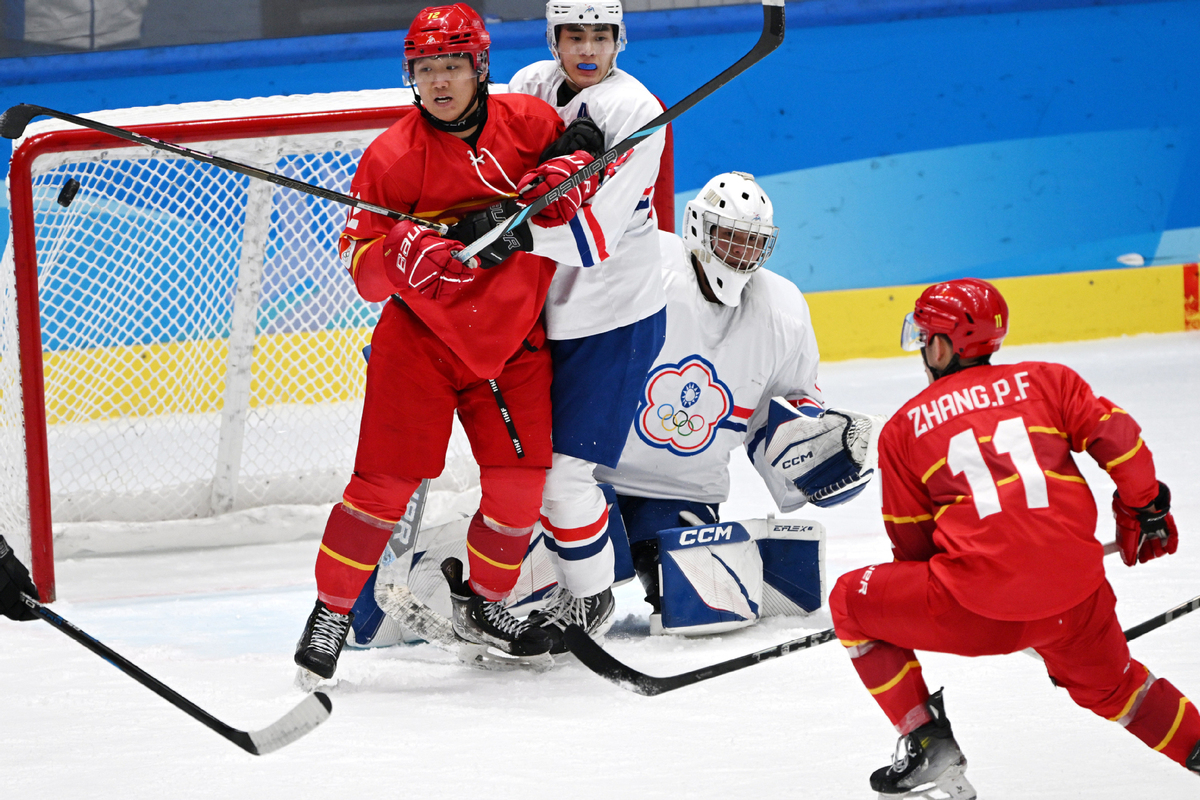
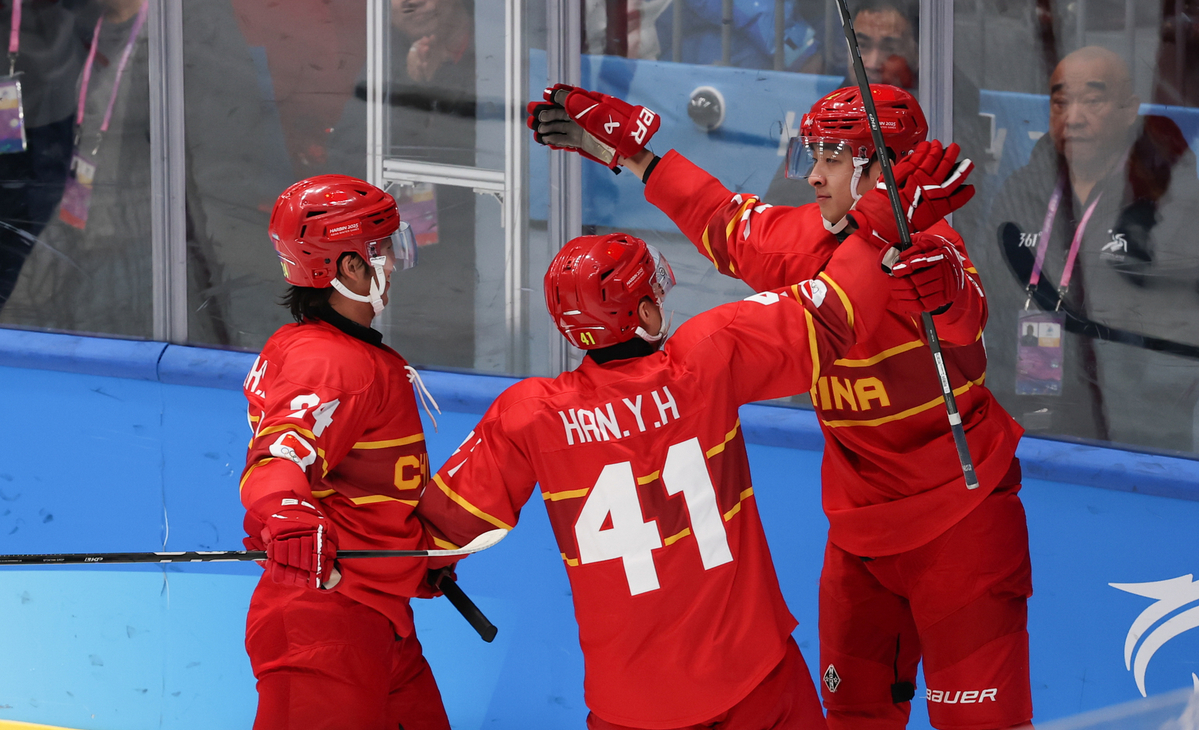
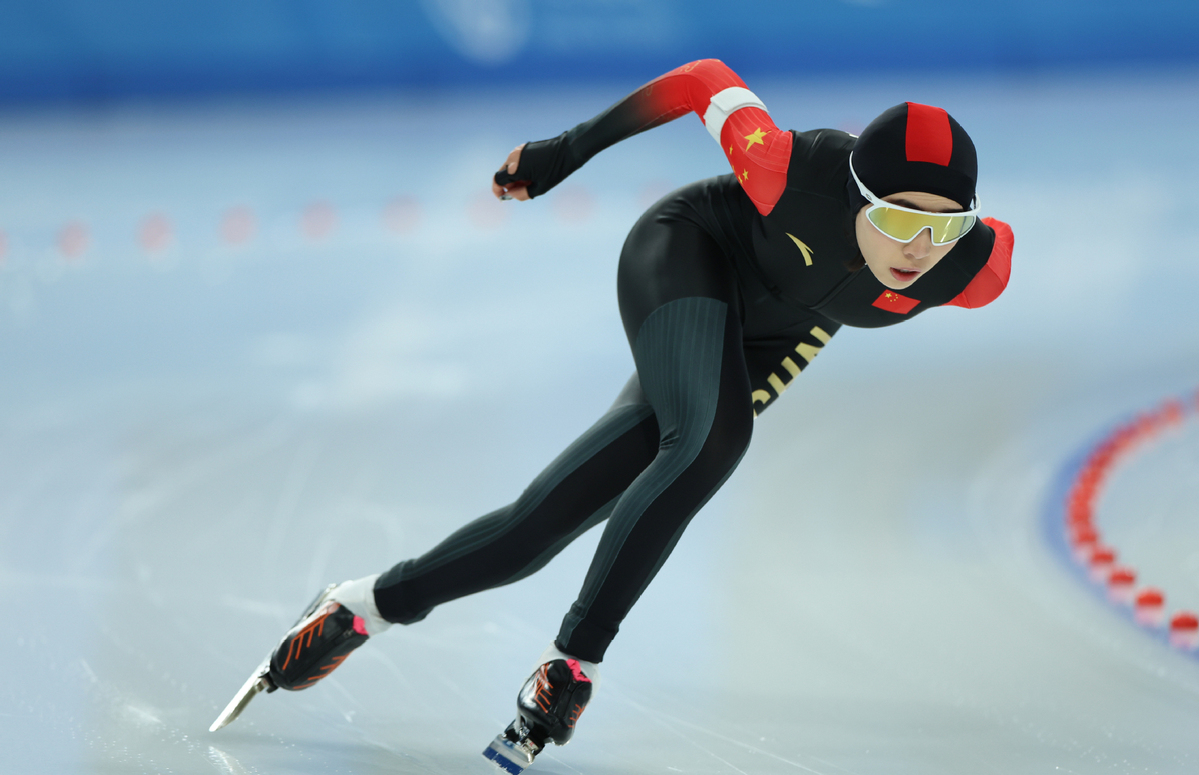
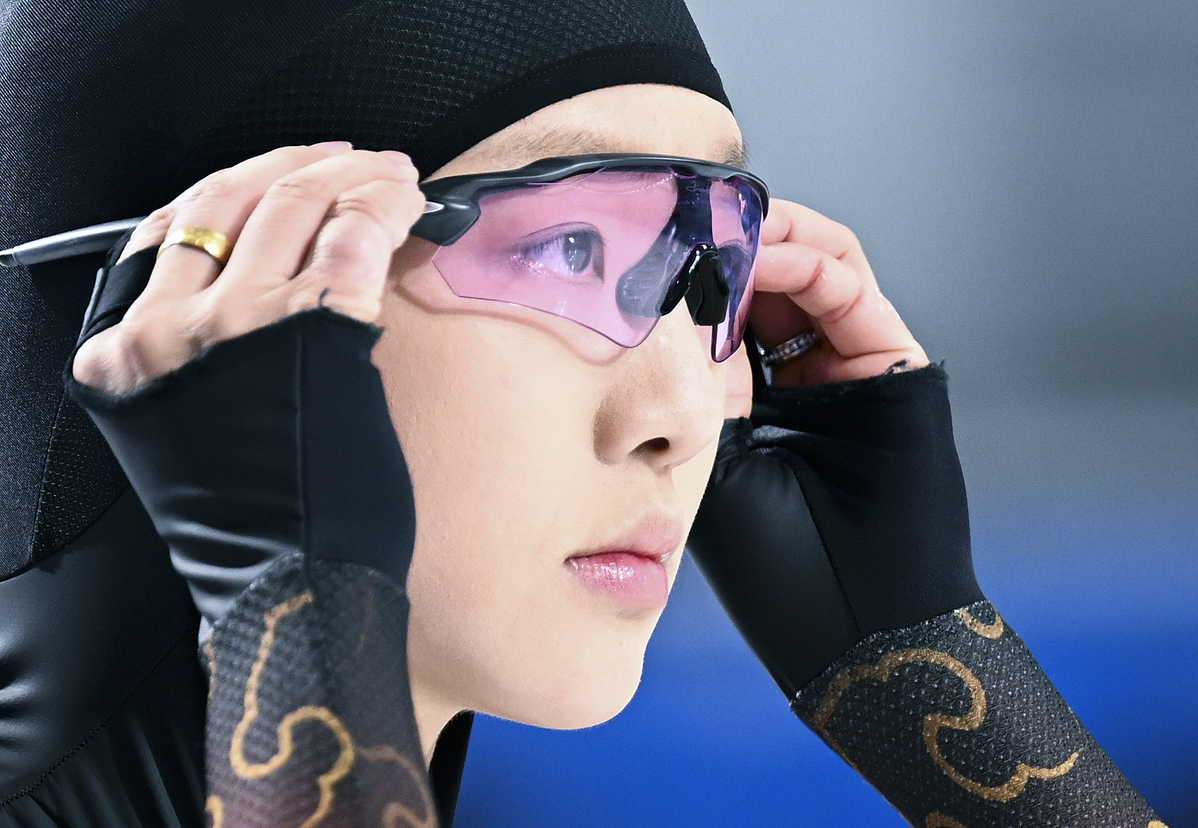
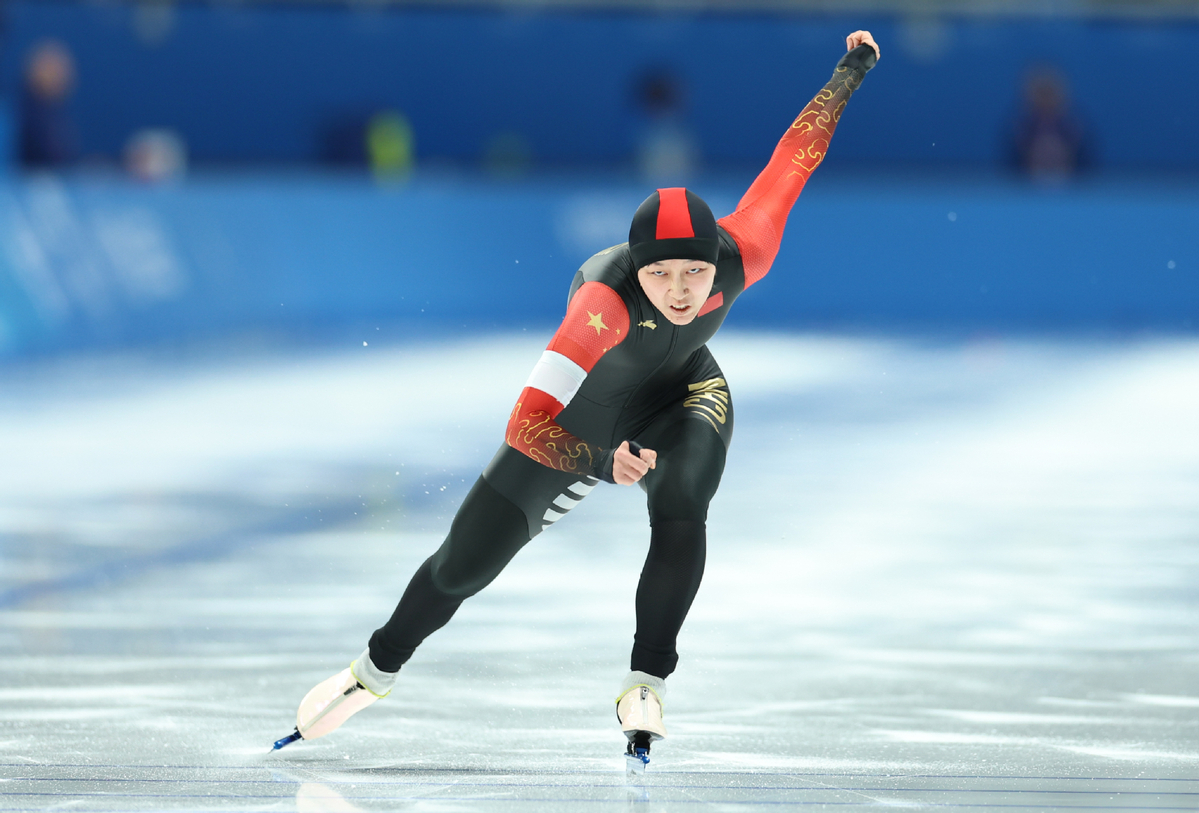
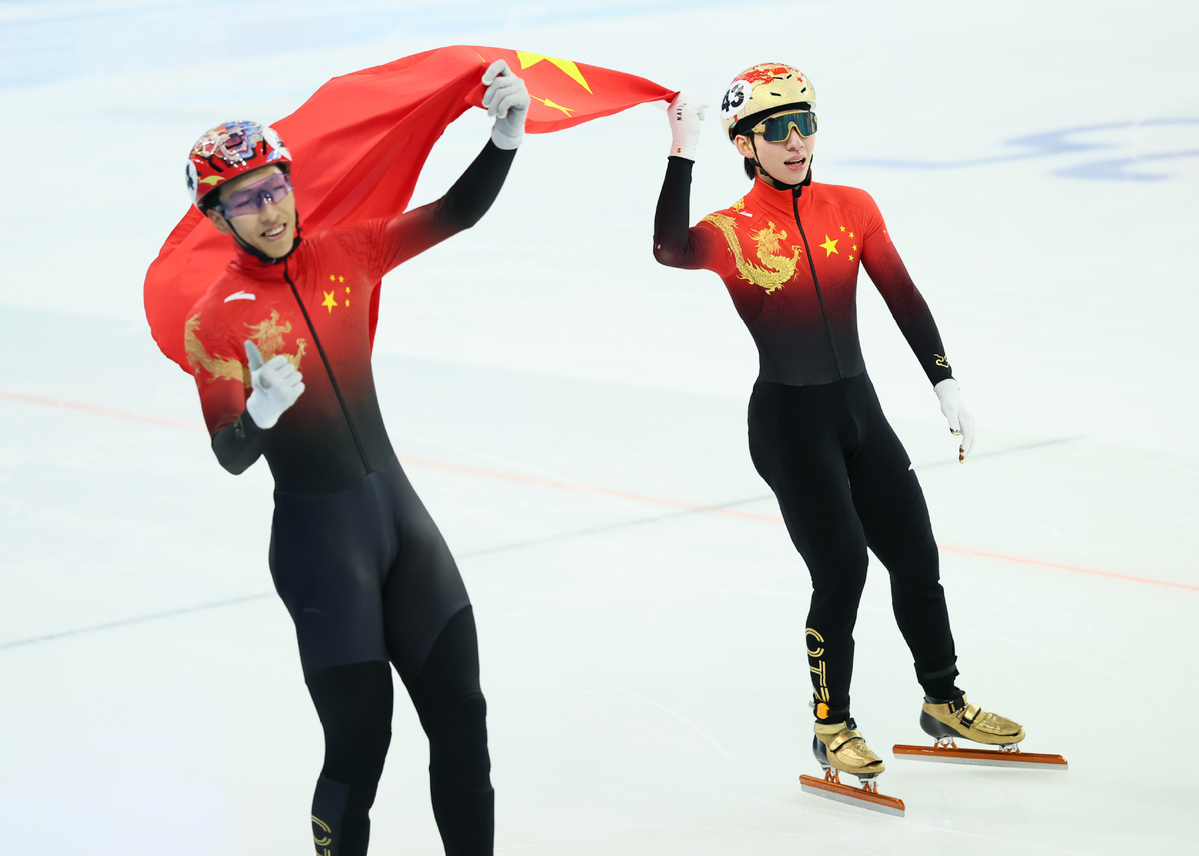
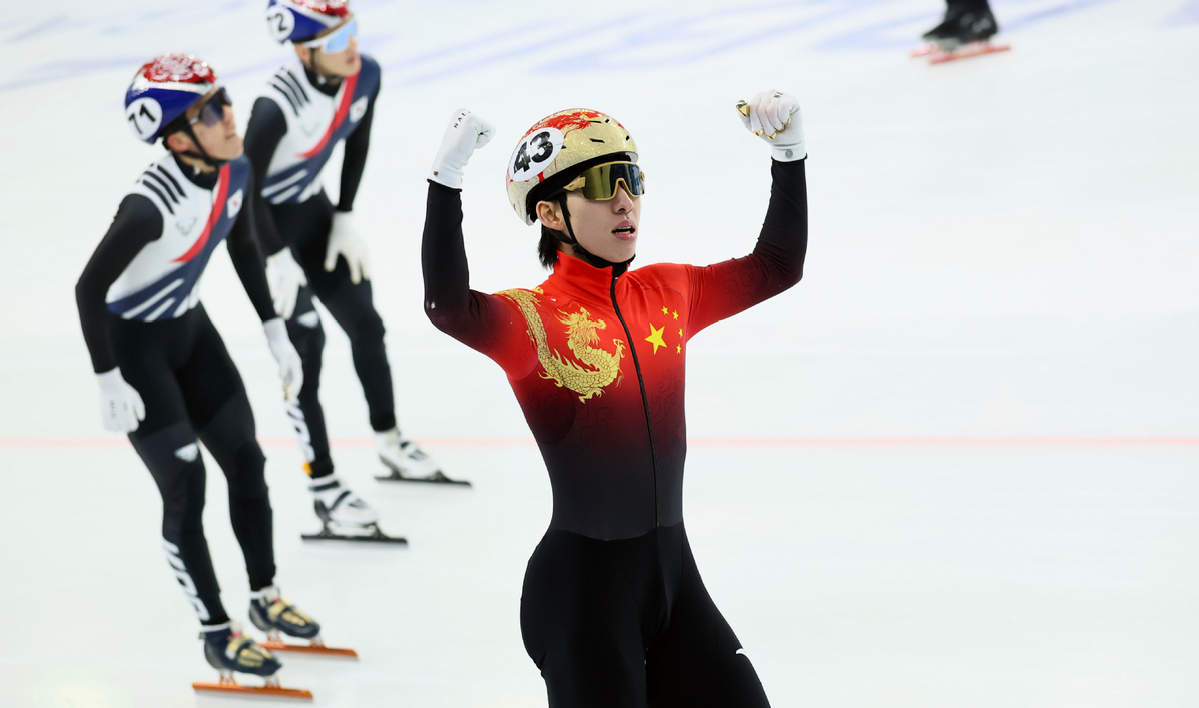
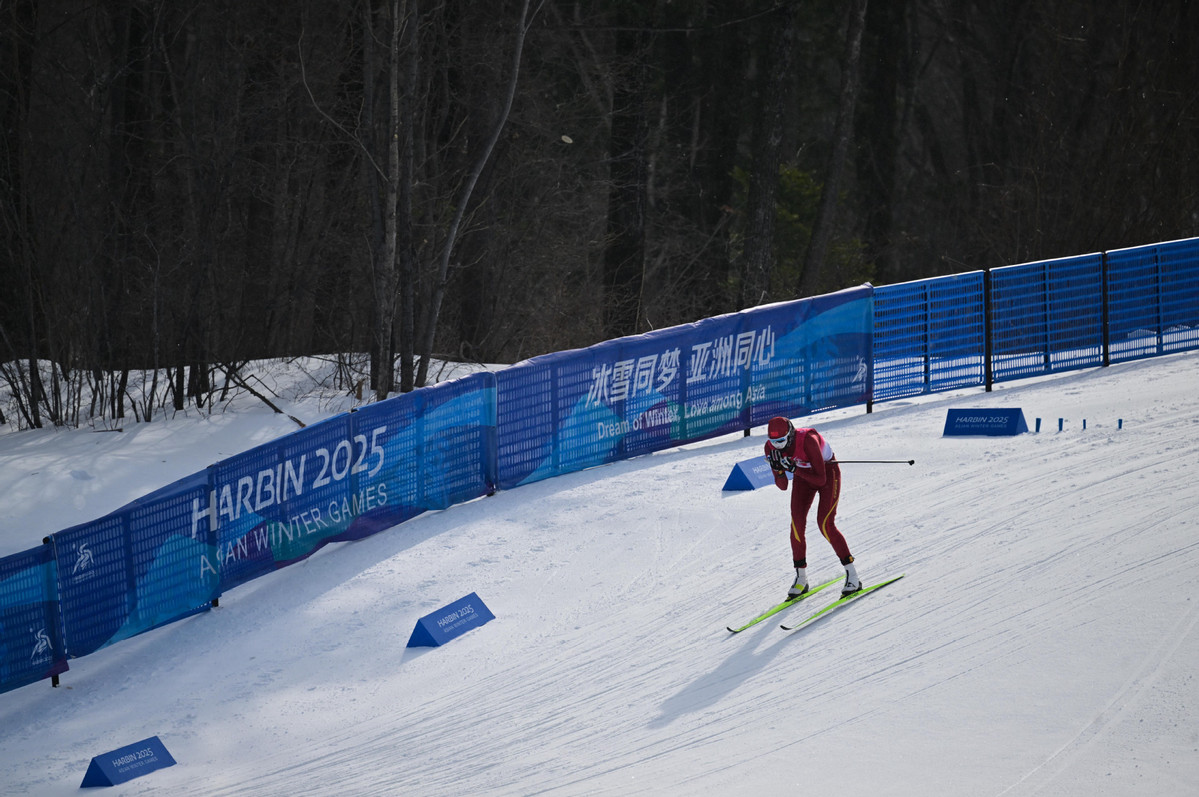
HARBIN - South Korea won the short track speed skating 2,000m mixed team relay to take the first gold medal of the 2025 Asian Winter Games (AWG) on Saturday, while Li Lei took China's historic 100th gold in the Games' history by triumphing in the cross-country skiing women's sprint classic final.
Anticipation was high in the Heilongjiang Ice Sports Center, as host China was among the four 2,000m mixed team relay final contenders for the Games' first gold medal. There was a winning sign for China until the last two laps when Lin Xiaojun tumbled off the ice on the curve right after taking over the lead from Liu Shaoang.
China eventually finished fourth, while South Korea clocked two minutes and 41.534 seconds to cross the finish line first.
Within two hours, Lin stepped on the men's 1,500m final track with high hopes. In a nail-biting sprint, Lin finished 0.029 seconds behind to settle for the second place, while Park Ji-won of South Korea claimed gold in two minutes and 16.927 seconds.
It didn't take long for Lin to bounce back, as the 28-year-old broke through under pressure from South Korean skaters in the men's 500m final, clocking 41.150 seconds to take the gold. South Korea's Park and Jang Sung-woo took the silver and bronze respectively.
In other short track speed skating races, Kim Gil-li of South Korea won the women's 1,500m final, with China's Gong Li and Zang Yize taking silver and bronze respectively. Choi Min-jeong of South Korea pocketed the women's 500m gold.
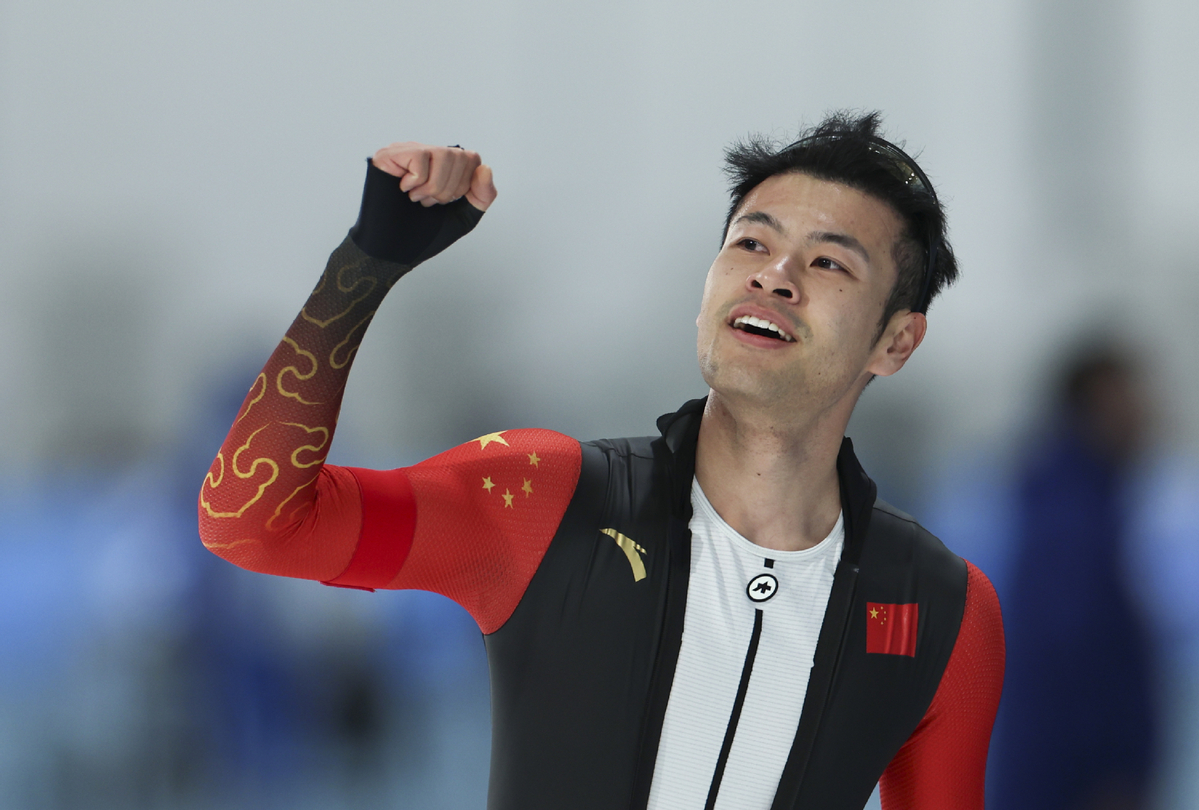
China took three of four speed skating gold medals on Saturday. Ning Zhongyan, one of the Chinese delegation's flagbearers at the opening ceremony, won the men's 1,500m race, while Chinese skaters swept the women's 1,500m podium, with Han Mei bagging the gold. China's Olympic champion Gao Tingyu took the men's 100m gold, while Lee Na-hyun of South Korea won the women's 100m race.
Several Chinese skiers put on remarkable performances on snow at the Yabuli Ski Resort.
Li Fanghui secured the host nation's first gold medal at the Harbin Games, triumphing in the women's freeski halfpipe event. The 21-year-old led the competition with a score of 95.25 points, with compatriot Zhang Kexin claiming silver with 89.25.
For the men's freeski halfpipe, Lee Seung-hun of South Korea took the gold on his last run of 97.50 points, and China's Sheng Haipeng finished second.
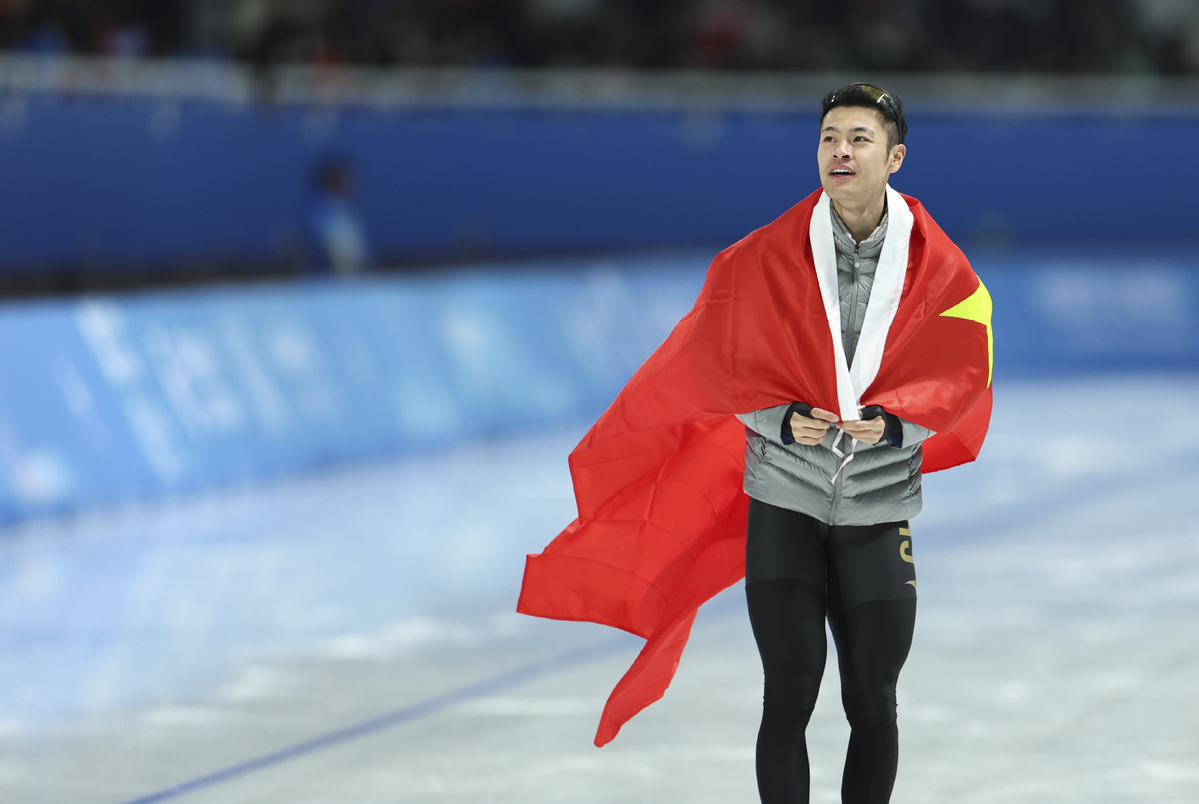
China dominated in the women's cross-country skiing sprint classic, with all four competitors advancing to the final. Veteran Li achieved victory in three minutes and 25.25 seconds, marking China's 100th gold medal in Asian Winter Games history. Her teammate Meng Honglian secured the silver in 3:25.91, while another Chinese Dinigeer Yilamujiang took the bronze.
In the men's sprint classic event, China's Wang Qiang finished the final with a time of 2:56.19 to secure the gold. Kazakhstan's Konstantin Bortsov took the silver, while Wang's teammate Saimuhaer Sailike claimed the bronze.
A near-flawless final run saw 18-year-old Zhang Xiaonan score 95.25 to clinch the gold for China in the women's snowboard slopestyle. China's Xiong Shirui secured the silver with 75.25 points, while 15-year-old Japanese Himari Ishii took bronze with a score of 69.50.
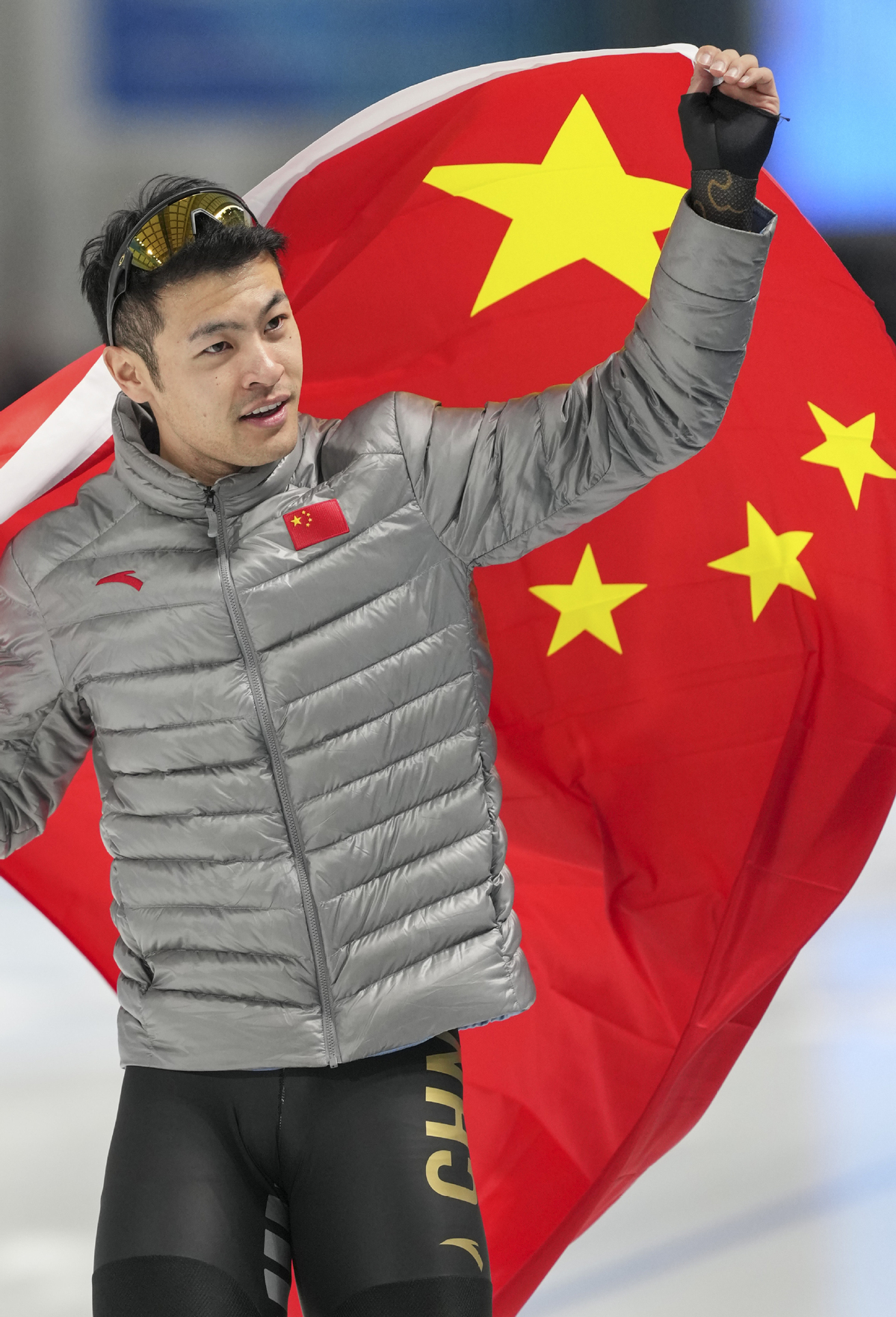
Lee Chae-un of South Korea won the men's snowboard slopestyle, followed by China's Liu Haoyu. Lee's teammate Kang Dong-hun finished third.
Also on Saturday, Japan claimed victory in the curling mixed doubles, while South Korea and China finished second and third, respectively.
China leads the medal table after Saturday's competitions with eight golds, eight silvers and five bronzes, followed by South Korea on 7-5-7 and Japan on 2-1-4.
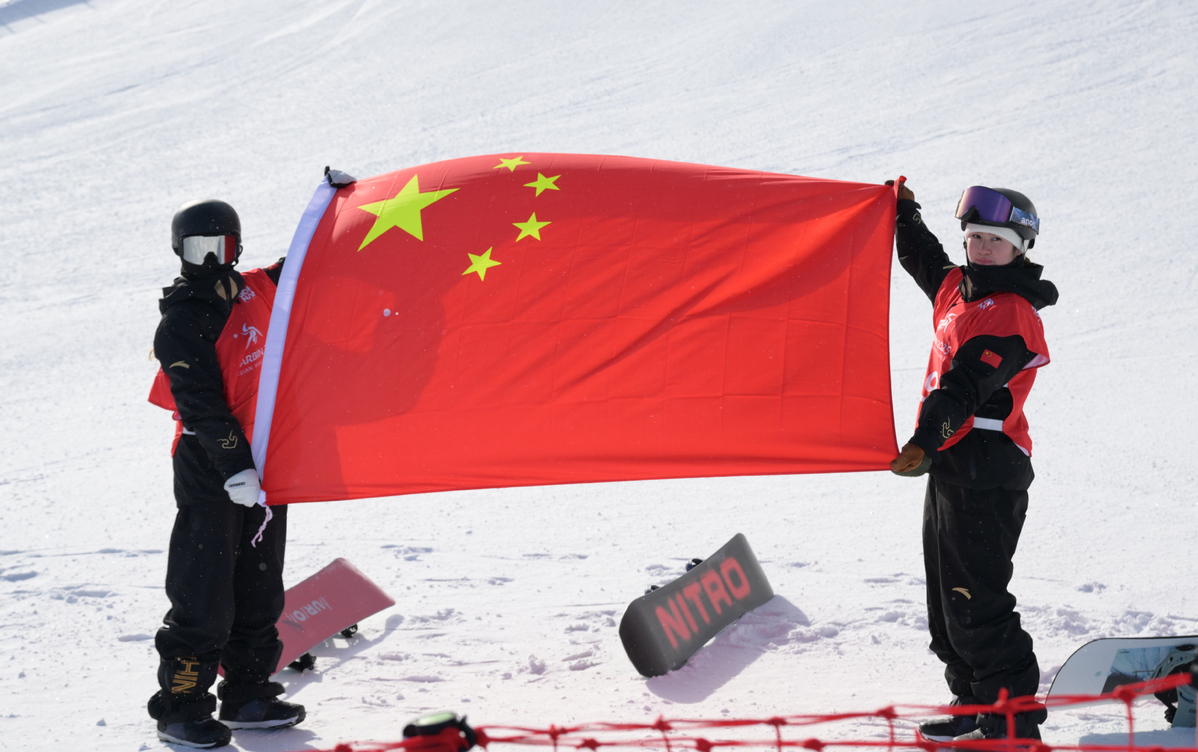
Chinese snowboarder Zhang Xiaonan, 18, delivered a dominant performance in the women's snowboard slopestyle event at the Asian Winter Games on Saturday, scoring 95.25 points to win the gold medal.
Zhang has been steadily rising in the sport, winning silver in the women's youth big air competition at the 14th National Winter Games in 2024. Last month, she placed fourth in the 2024-2025 FIS Snowboard and Freestyle Skiing Big Air World Cup Finals in Austria.
"I'm in great form this season, and my goal at the Asian Winter Games is to win gold in both slopestyle and big air," Zhang said.
Her performance in the final showcased her consistency, executing a series of difficult flips and smoothly navigating rails and jumps. She improved with each round, scoring 80.75, 88.75, and finally 95.25 to secure her lead.
"I made adjustments after each round. In the first round, I was relatively conservative, focusing on stability, while the following two rounds were the time for me to go all out," she said.
China's Xiong Shirui took silver with 75.25 points, while Japan's Ishii Himari claimed bronze with 69.50.
"I'm not satisfied with my performance today. I was aiming for gold, but I'm still happy to win silver. I just feel like I could have done better," Xiong said.
She thought one reason her performance today wasn't that good was she wasn't confident enough in herself, which led to a pretty average performance in her last two runs.
Despite the challenges, she praised the conditions at Yabuli. "The snow quality was excellent! It's the best time of the season, and with all the fresh snowfall, the jumps felt really smooth. The only issue was the strong wind," the 17-year-old said.
In the men's snowboard slopestyle event, China's Liu Haoyu secured silver, while South Korea's Lee Chaeun took gold and Kang Donghun claimed bronze.
liyingxue@chinadaily.com.cn

Despite the extremely cold weather, the frozen lake at the Qunli Lilac Park in Harbin, the capital city of Northeast China's Heilongjiang province is bustling with excitement.
Every autumn, staff members at the park fill the lake with water, and as the temperature drops, it turns into a natural ice rink.
Nearby residents flock to the park to skate and slide around, calling it their "winter wonderland", and the ongoing 9th Asian Winter Games in Harbin have further ignited local residents' passion for winter sports.
This winter, Harbin has fully utilized parks, squares, public institutions, universities and natural bodies of water to produce public ice rinks, ensuring that residents and visitors can participate in outdoor winter activities.
In Harbin, physical education classes in schools revolve around winter sports. Some schools have built ice rinks on their playgrounds, allowing children to enjoy the fun of ice and snow sports without having to leave the school grounds.
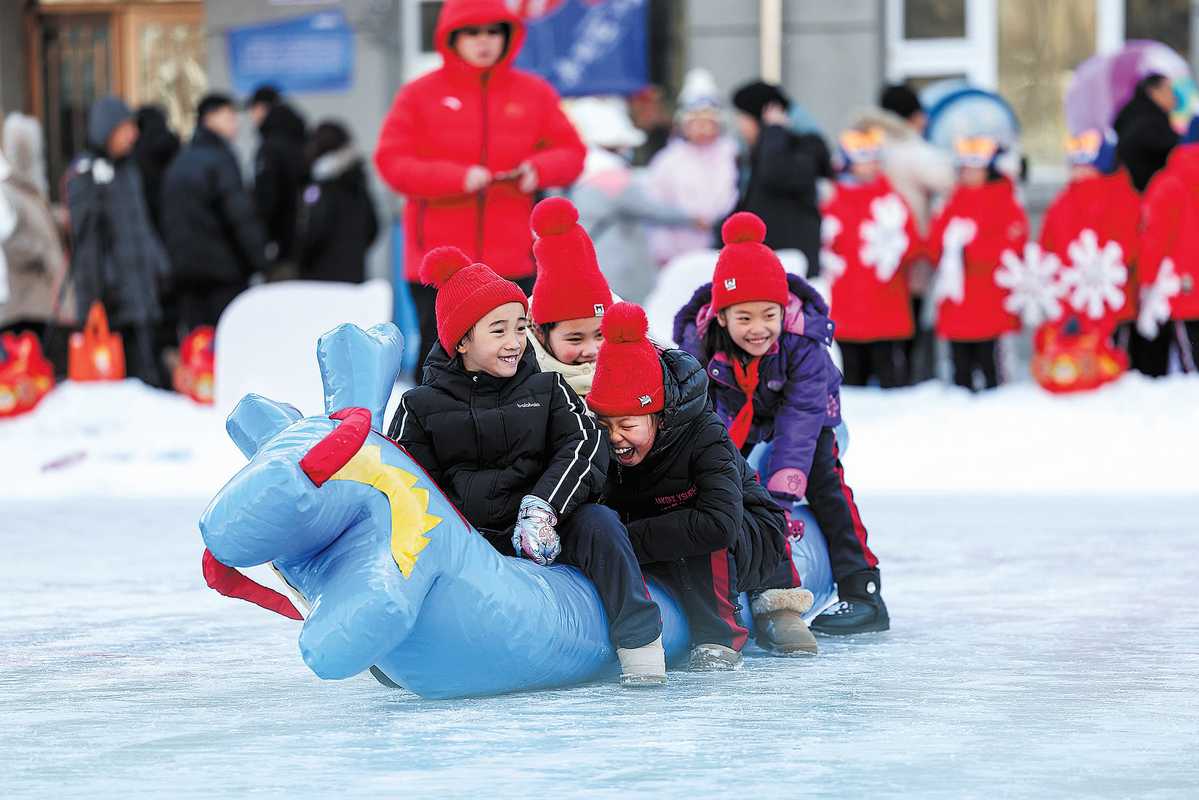
"In the icy world of Harbin, children have a deep bond with ice skating and skiing from a young age," said skating coach Chen Ping. "Many students can glide on the ice and dash through the snow effortlessly, often without much guidance or training."
In conjunction with the Games, a series of youth activities are being held until March.
Over 400 ice rinks will be built in primary and secondary schools throughout the city, alongside nearly 150 cross-country skiing courses at schools with suitable conditions.
Moreover, classes in ice skating, skiing, ice hockey and curling have been organized, as well as other fun winter sports activities, like snow soccer matches.
Drawing inspiration
In early January, around 100 sculptors and workers spent more than 20 days constructing an ice sculpture of the CNS Liaoning aircraft carrier on the frozen Songhua River in Harbin.

Built at a scale of 1 to 6, the sculpture used 350 metric tons of ice, and measured 72 meters long, 15 meters wide and stood 13 meters high.
"Different from traditional ice sculptures, it was built on a barge base with a steel frame, with its external shape crafted with ice blocks," said Chen Rongxin, designer of the sculpture.
During the construction process, the team modified its plans several times based on the ice's load-bearing capacity and the ship's weight to ensure the safety, accuracy and aesthetics of the sculpture.
At Harbin Engineering University, more than 1,600 teachers and students completed three massive snow drawings on campus, including one of China's third aircraft carrier, the CNS Fujian, and the mascots of the 9th Asian Winter Games, Binbin and Nini.
Students mapped out the drawings using high-precision positioning from the Beidou Navigation Satellite System.
Viewed from above, Binbin and Nini are depicted enjoying the snowy landscape as the latter soars into the air on a snowboard, as if saying hello to visitors from around the world.

"We spent about a month refining the outline, drawing it in using CAD (computer-aided design), and marking the key points," said Wang Qian, the overall director of the project and a teacher at the university's mechanical and electrical engineering school. "The design needed to be possible to recreate, and be aesthetically and artistically pleasing."
Despite the extreme cold, students were enthusiastic and proud of the completed work, which took around two hours to create.
Making a splash
In the past three decades, Yu Xiaofeng has never missed her daily swim in the Songhua River, even when temperatures in Harbin recently dropped to as low as — 20 C.
Yu, 61, a retired civil servant, is famous among winter swimmers in the city.
"I was born in Harbin and fell in love with swimming in my childhood, but until 1994, I never thought I could swim in the freezing Songhua River," she said. "In the late autumn of that year, I found some of my colleagues swimming in the river and decided to give it a try."
"It was not very cold at that time," she said. "However, when the weather became gradually colder, I found that I had adapted to the freezing water."
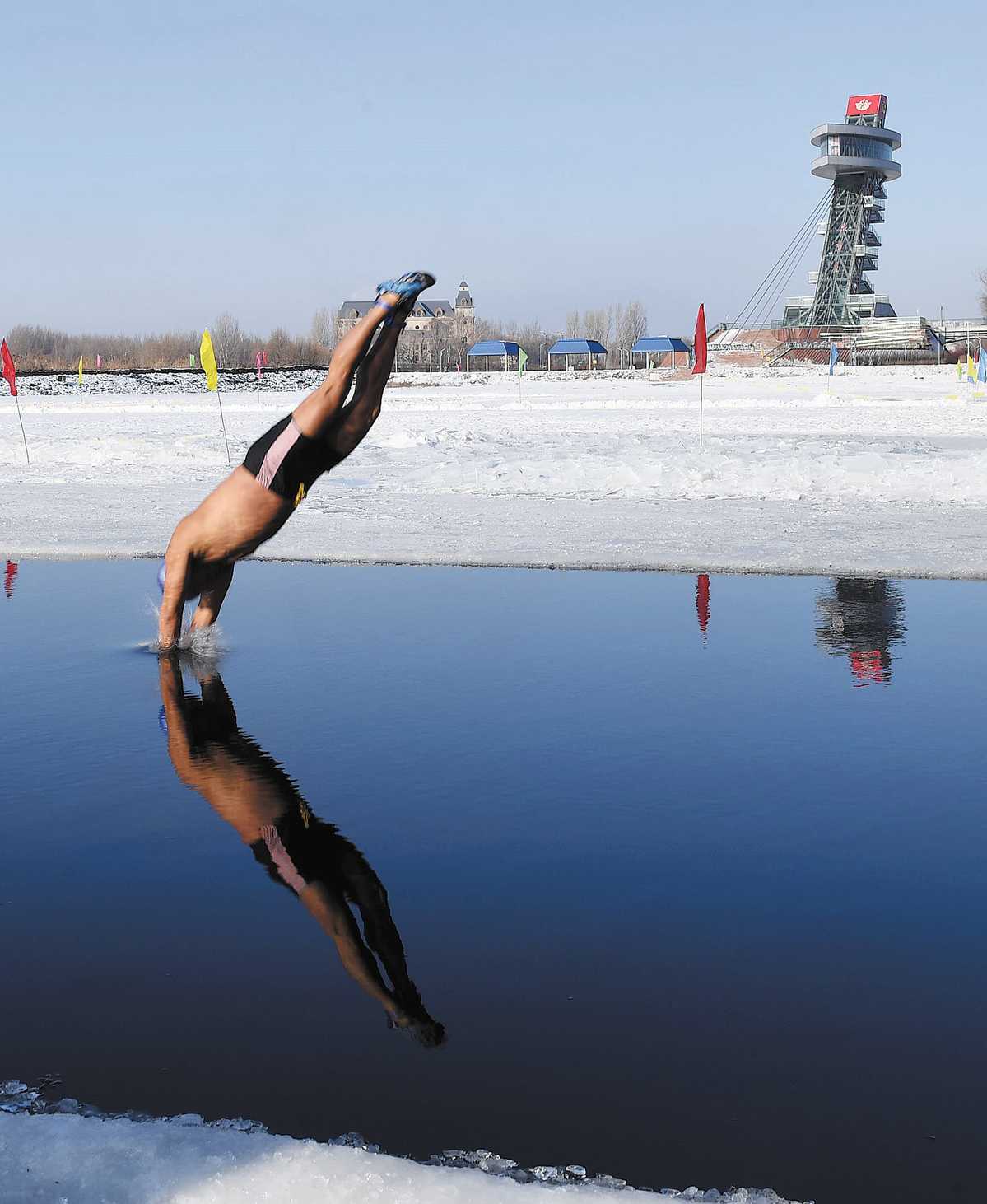
She became a longtime winter swimming enthusiast, and the extreme cold and strong wind on the river never dimmed her enthusiasm for a dip.
Before retirement, to avoid interfering with work, every day she would get up at about 5 am and go swimming after preparing breakfast for her son.
It became a habit that's lasted until today.
"It is not very easy to get up so early every day now, especially in the cold winter," she said. "The greatest victory is overcoming oneself."
Before diving into the icy river, she will do some warm-up exercises, such as jogging and yoga. And her jump into the Songhua River from a diving platform often draws a rousing ovation from the crowd.
"Winter swimming makes me feel healthy and I feel good," she said. "I will carry on doing it."
Contact the writers at zhouhuiying@chinadaily.com.cn
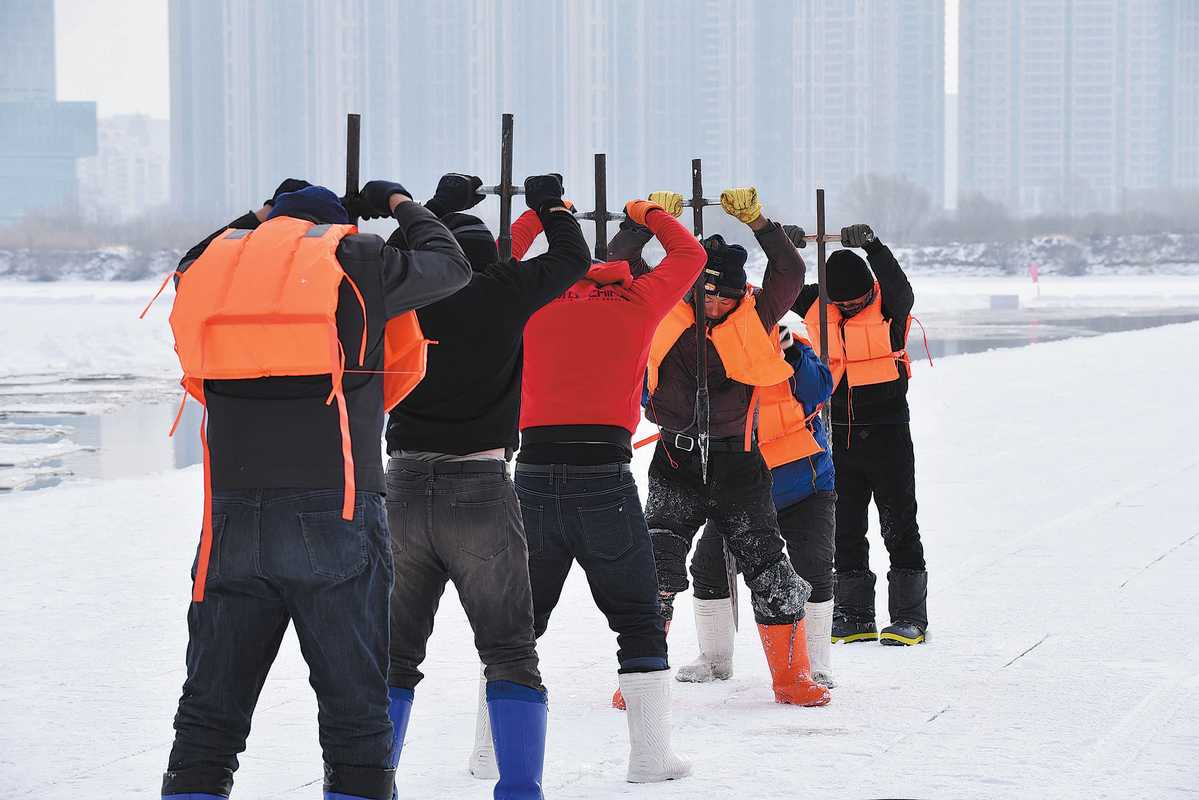
In early December, as the ice harvest started in Harbin city, capital of Northeast China's Heilongjiang province, Zhang Jiucheng welcomed his busiest period of the winter.
Over the following weeks, as the night chill would devour the last warmth of the day, Zhang would get up and gingerly leave his home in Wanbao township.
The ice on the Songhua River was waiting for him.
Over the past 26 years, Zhang has spent around 20 days every winter cutting blocks of ice from the frozen river, which are then transported to Harbin where artists carve them into various shapes to transform the city into a glistening wonderland.
In — 20 C temperatures, the sharp river wind blows through Zhang's cotton-padded jacket, and ice-cold water splashes on him, forcing him to take an extra jacket to avoid freezing.
"To protect yourself from cold is of prime importance for this job, otherwise you can neither cut ice anymore, nor make money," Zhang said.
This year, ice-cutting posed a particular challenge to workers like Zhang, because the 26th Harbin Ice and Snow World expanded its scale, requiring more than 300,000 cubic meters of ice.
The intense schedule rushed the thousands of ice cutters onto the river's surface.
"Not everyone can do this, you have to have a strong body, and you have to be quick and skillful," Zhang said. "And, above all, you can never do it all yourself."
Zhang's team has 10 members, and they all work well together, which is "essential for ice-cutting", he said, adding that each block of ice is about 80 centimeters wide, 40 cm thick and 160 cm long, and weighs about 600 kilograms.
First, the team locates the right place near the riverbank, where the ice is the right thickness. Then, they fix an iron rod on the bank and tie a rope to it. The other end is attached to the waist of a worker who stands on the ice and uses a chain saw to cut out a large block.
When the block is about to come loose, they attach it to hooks and then use a towline to lift the slab onto the bank, where it is cut to the required size and taken to the truck for transport.
Every few hours, members of the team take turns doing different tasks.
"There are several rules of thumb. First, don't go to the middle of the river because torrential water under the thin ice can be dangerous," Zhang said.
"Nor can you use the ice within five meters of the bank, because it's always filled with silt," he added.
Moreover, he explained, the worker with the chain saw can never cut along the direction of the current — unless he wants to cause the ice surface to collapse and fall into the water.
"If the worker doesn't cut it right, all the other workers will be in danger. Furthermore, although we tie a rope on the cutter, the freezing water and his heavy clothes are still extremely dangerous if he falls into the river."
Zhang followed that up by noting that he hasn't heard of such an accident occurring for decades.
Due to his rich experience, in recent years, Zhang has also been to some other cities in Heilongjiang, such as Shuangyashan and Jiamusi, to farm ice.
"I have been to so many places to collect ice, but the ice from the Songhua River in our city is the best and the clearest," he said. "I am always proud of it."
Contact the writers at zhouhuiying@chinadaily.com.cn
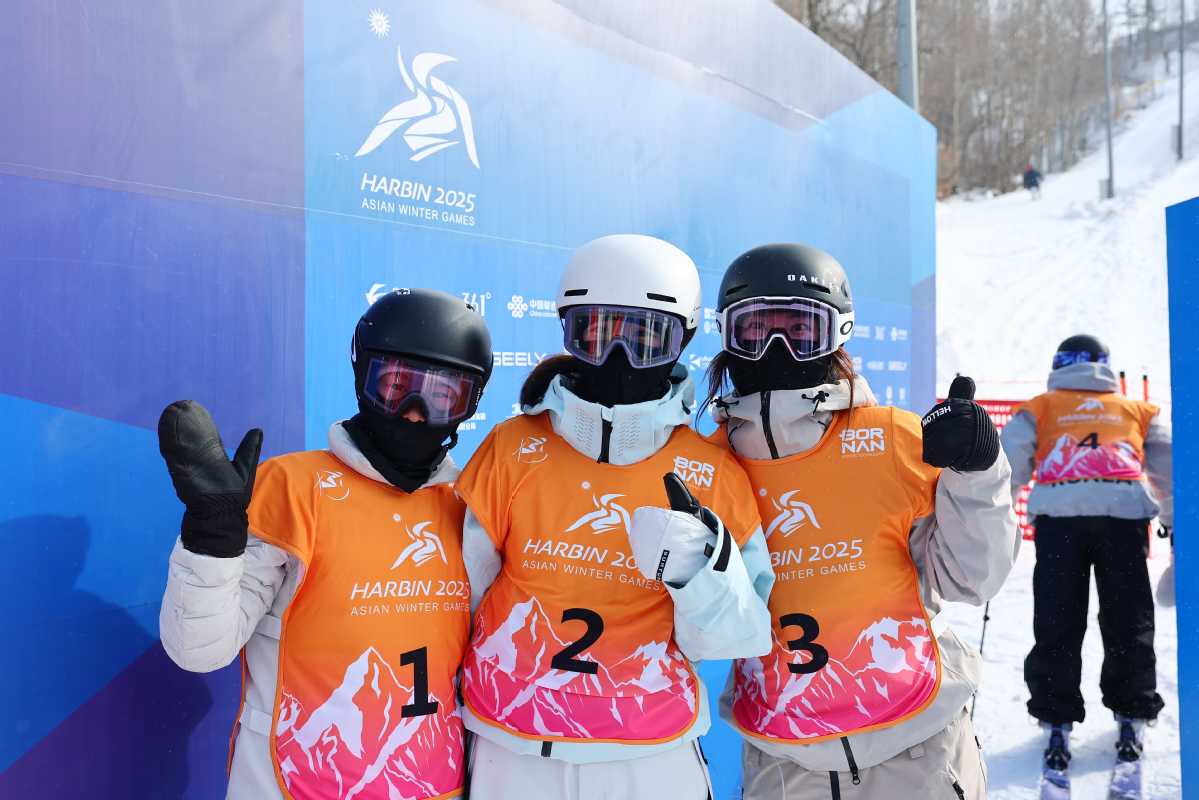
The 9th Asian Winter Games kicked off its first day of competition today in Harbin, Heilongjiang province, with an impressive start for China. In the women's freeski halfpipe final, Li Fanghui delivered a dominant performance, scoring 95.25 points to secure the country's first gold medal of the Games. Her teammate Zhang Kexin claimed silver with 87.50 points.
Born in Harbin in 2003, Li has been a rising star in Chinese freestyle skiing. She won silver at the 2016 National Winter Games and the 2020 Lausanne Winter Youth Olympics in the women's team freeski halfpipe. This time, Li, the last minute call-up following Olympic champion Gu Ailing's withdrawal because of injury, finally claimed the top podium spot.
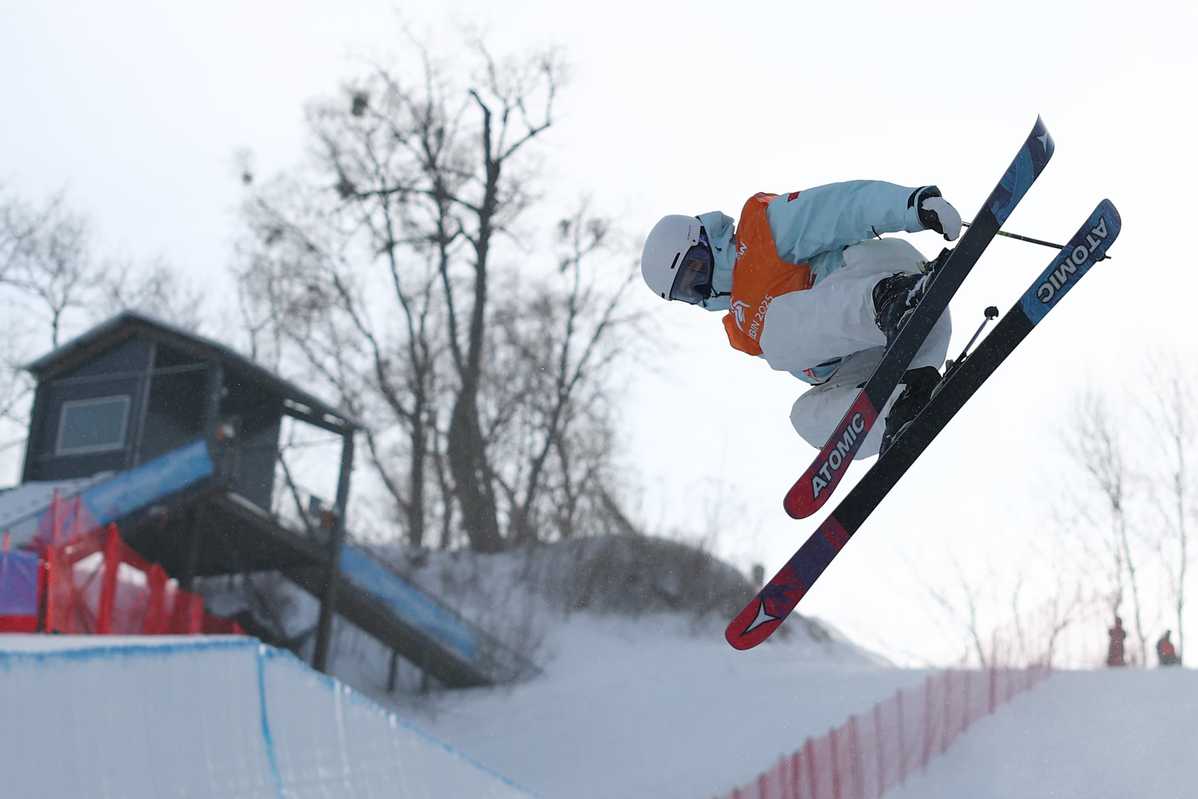
"I'm thrilled to compete at such a high-level event in my hometown and even happier to win China's first gold," Li said.
Returning to Harbin for the competition also gave Li the chance to enjoy a hometown favorite—guobaorou (sweet and sour pork)—a dish she had been craving throughout Spring Festival. Encouraged by her family, she focused on delivering her best performance.
Li set the tone early, scoring 93 points in her first run before landing a 95.25 in her third. "I played it safe in the first run, then increased the difficulty in the second and third," she said.
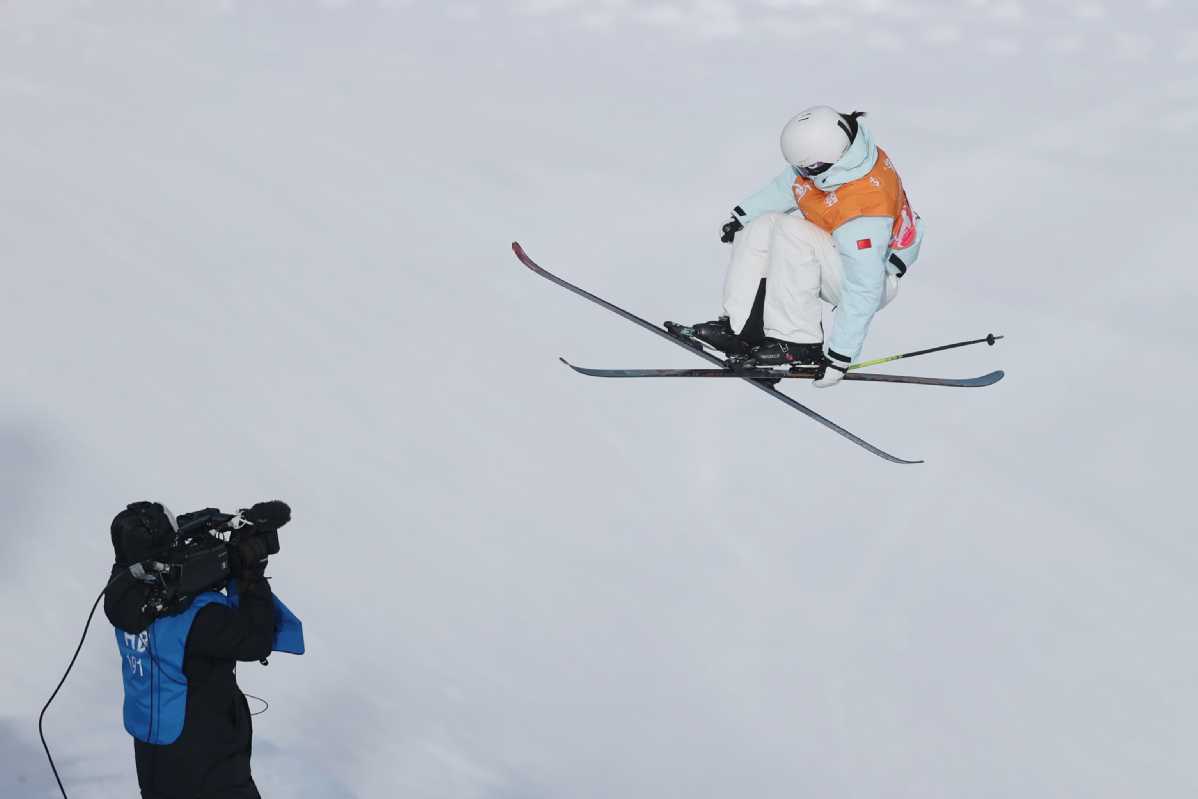
Adapting to weather conditions, wind speed and direction, Li made key adjustments to her tricks. "My style is clean and distinct," she noted.
Li's journey to the top hasn't been without challenges. Ahead of the 2024 National Winter Games, she fractured her collarbone for the third time but still managed to secure silver in the women's freeski halfpipe open category.
"I was afraid of getting injured again, and my mindset wasn't great," she recalled. "But over the summer and fall, I gradually adjusted my mentality. Injuries aren't that scary - improving my skill level is the key to consistency."
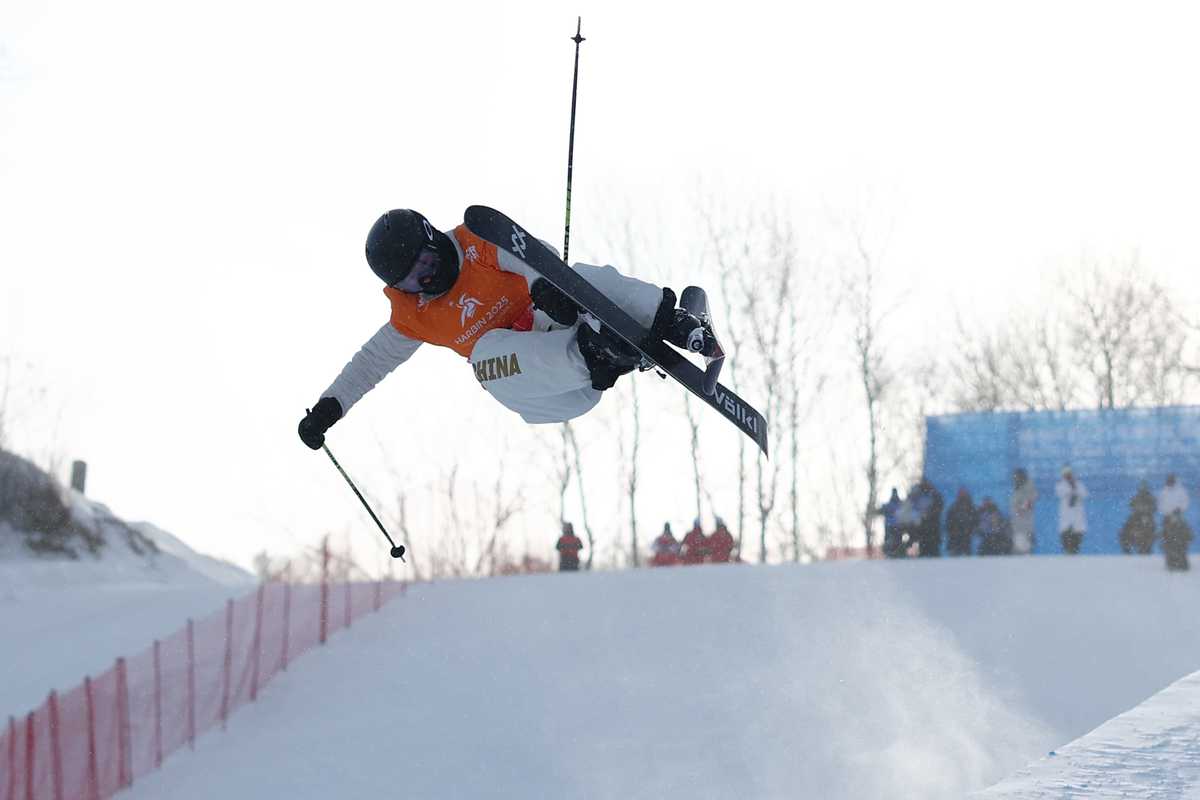
Silver medalist Zhang, born in 2002, is also from Harbin. A national team member since 2016, she competed in the 2022 Beijing Winter Olympics, finishing seventh in the women's freeski halfpipe final.
Reflecting on the growing success of Chinese female skiers in international freeski halfpipe competitions, Zhang credited their comprehensive technical development.
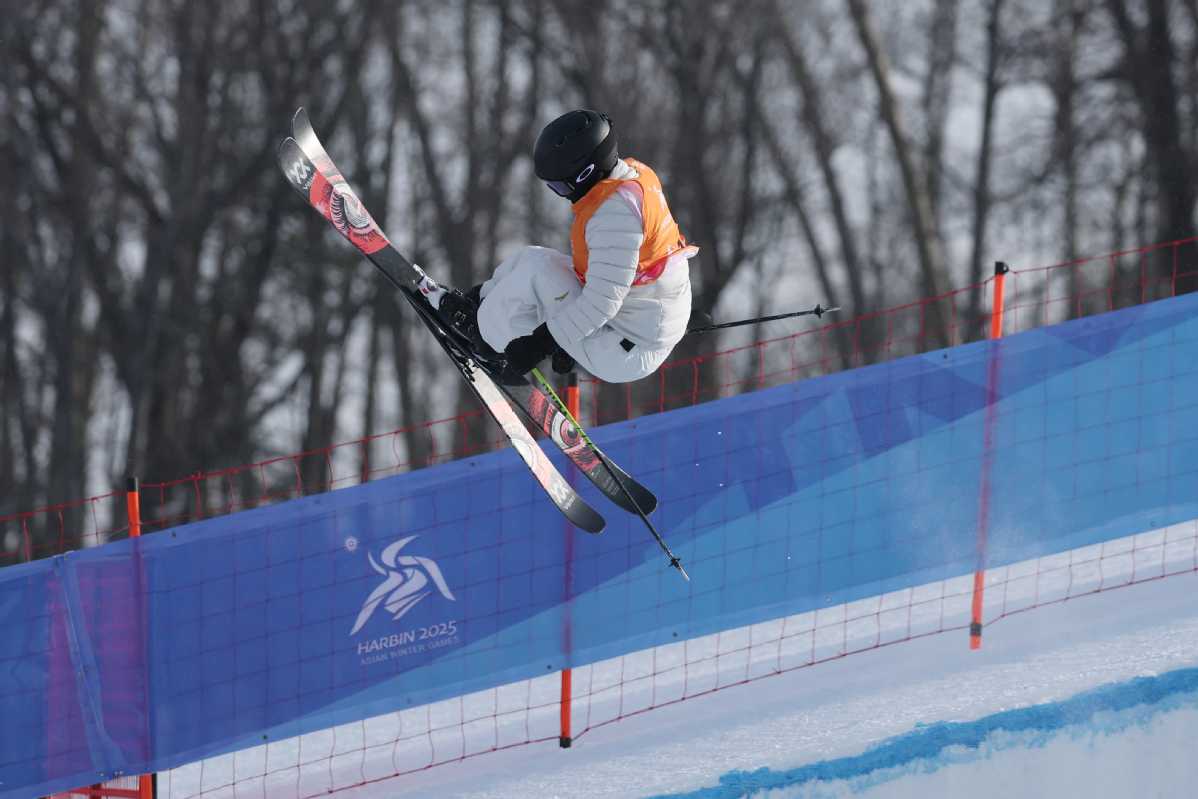
"We're well-rounded in both forward and switch tricks, as well as in overall difficulty and variety," Zhang said. "In training, we design our runs based on both the judges' scoring preferences and our strengths."
However, she acknowledged ongoing challenges. "We don't always perform well—it often comes down to experience and consistency. Many competitors have been on snow longer than us, so we need to focus on improving our stability."
Liyingxue@chinadaily.com.cn
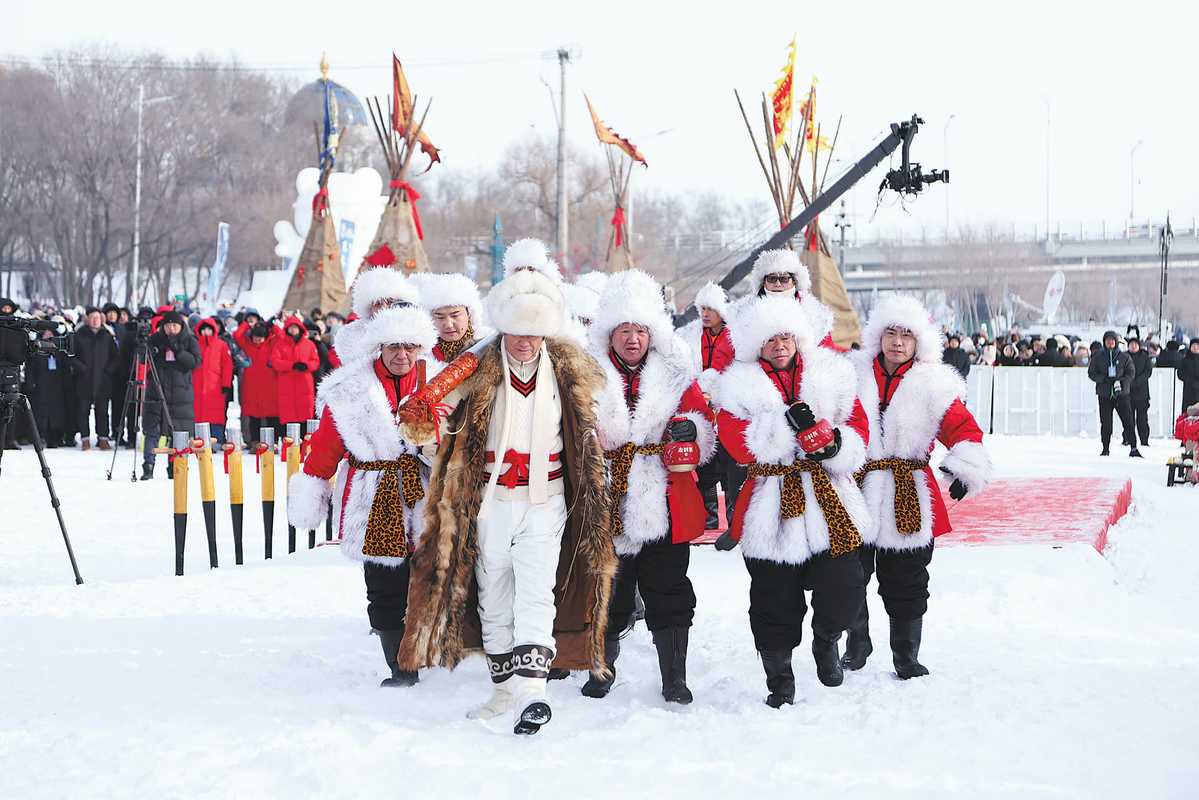
In the presence of a biting wind, fur-clad workers wielded steel chisels to tackle the frozen surface of the Songhua River, producing a large crystalline slab of ice to the cheers of spectators in Harbin, Northeast China's Heilongjiang province.
The ice block, dubbed the "first ice" of the year, was harvested amid the rhythmic chants of workers, signaling the start of Harbin's annual ice-cutting season on the Songhua River, which winds through the city.
This winter, the iconic ice-cutting festival in Harbin started on Dec 7, and is one of China's most popular ice-and-snow tourism destinations, attracting thousands of tourists from home and abroad.
Every year, in early December, when the temperature drops low enough, the annual ice harvest on the Songhua River begins — a spectacle eagerly anticipated by locals and tourists, alike.
"From the kickoff ceremony onward, we spend 20 to 30 days every winter harvesting ice from the frozen river. The colder it gets, the busier we are," said Wang Zhan, a veteran of the trade.
"During peak times, nearly a thousand ice collectors may work together, harvesting up to 10,000 cubic meters of ice daily," Wang added.
Wang explained that ice blocks must be harvested from river sections with both stable water flow and quality to ensure uniform density and clarity.
Once the site is chosen, he and his co-workers wait for the ice layer to reach a thickness of at least 30 centimeters before beginning the process.
"We start by marking the designated area and carving out the shape of the blocks using mallets and chisels," Wang said.
"Once that's done, we switch to chain saws to cut the ice into blocks measuring 160 centimeters long and 80 centimeters wide, which are then lifted from the river to be transported."
With more than a decade of ice-cutting experience under his belt, Wang has grown accustomed to the chorus of clattering chisels and buzzing chain saws.
He expressed joy at seeing the ice-collecting tradition, along with local customs and delicacies, reaching a wider audience through this event.
Artists carve the blocks into fanciful sculptures, transforming the city into a winter wonderland.
The traditional ceremony attracted thousands of residents and tourists who braved the extreme cold and strong wind on the frozen river.

With the Asian Winter Games officially underway in Harbin, capital of Heilongjiang province, the intense action is matched by an equally rigorous commitment to anti-doping, ensuring that athletes compete in a clean and fair environment.
The Olympic Council of Asia is overseeing the anti-doping measures for this year's Games, entrusting the International Testing Agency with the development of the testing protocols, therapeutic use exemption reviews, results management and intelligence sharing. The China Anti-Doping Agency will handle sample collection, while the Beijing Anti-Doping Laboratory will be responsible for analyzing them.
Zhou Jinqiang, vice-chairman of the Asian Winter Games organizing committee and vice-chairman of the Chinese Olympic Committee, noted that anti-doping initiatives are a fundamental part of any major international sporting event.
The Games will strictly adhere to OCA regulations, with seven doping control stations strategically placed across the competition venues and the athletes' villages. Athletes may be tested at any time, and at any location, without notice in advance. A team of 55 doping control officers, both domestic and international, oversee the process, according to Zhou.
In an effort to foster awareness and education, the Games have established anti-doping outreach stations in Harbin and Yabuli. These stations will host a range of engaging activities aimed at educating athletes and participants about anti-doping, while reinforcing the values of fair competition and sportsmanship.
The organizing committee has also put in place stringent measures to address food, medical and drug-related doping risks. A comprehensive prevention system has been created to ensure the safety of athletes' nutrition, treatment and medication throughout the event, Zhou said.
Ahead of the Asian Winter Games, Doping Control Coordination Center of the Games has taken proactive measures to ensure robust testing protocols by commissioning a team of experts from the China Anti-Doping Agency to inspect seven key doping control stations, including the Heilongjiang Ice Training Center, Harbin Ice Hockey Stadium, Harbin Sport University Ice Skating Rink, and the Pingfang District Curling Arena in Harbin.
The experts identified several areas for improvement, offering recommendations to enhance the testing experience for athletes. These included suggestions on optimizing station layouts, upgrading facilities and improving overall efficiency.
Zhang Yan, deputy commander of the anti-doping command center, assured that venue teams would work closely with the experts to implement these changes, ensuring that all stations are fully operational, secure and in compliance with established standards, providing solid anti-doping support for the Games.
Additionally, a training session was held for venue coordinators, where experts outlined their roles, responsibilities and operational workflows. The session also included the sharing of insights and best practices derived from previous international events, equipping the team with the knowledge and skills needed to maintain the integrity of the testing process.
The Heilongjiang provincial quality supervision and testing research institute is leading the charge on food-related anti-doping testing for the Asian Winter Games. Over the course of two-and-a-half months, the team analyzed more than 110 samples, performing nearly 2,100 individual tests. They successfully established a testing system for 60 foodborne doping substances, passing rigorous inter-laboratory validation.
"Every minute of those two-and-a-half months was incredibly valuable," said Li Donggang, deputy director of the institute. "Given the volume of samples and the complexity of the tests, failure was a frequent challenge, but the team remained relentless."
In line with the organizing committee's anti-doping plan, the institute dispatched specialists to conduct random checks on animal-based food products — pork, beef, lamb and fish-across regions in the Inner Mongolia and Xinjiang Uygur autonomous regions, and Heilongjiang province.
They also tested a range of other foodstuffs, including soy sauce, vinegar, curry, coffee, cashews and blueberry jam provided by food suppliers for the Games. Samples were swiftly delivered to the laboratory for testing, following strict guidelines to preserve their integrity.
In a bid to ensure the quality of food-related anti-doping testing at the Asian Winter Games, the China National Accreditation Service for Conformity Assessment dispatched a team of technical experts to Harbin last month. The visit provided crucial on-site guidance to support the testing operations.
Contact the writer at liyingxue@chinadaily.com.cn
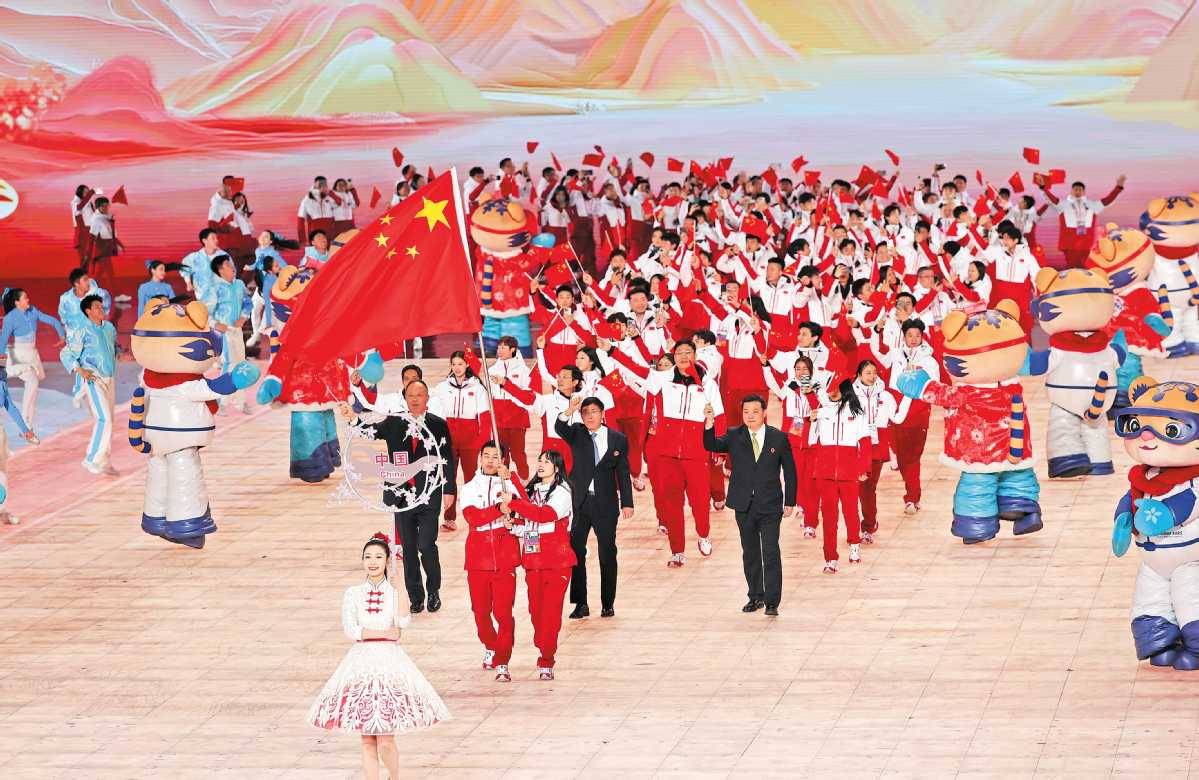
Speed skater and Heilongjiang native, Ning Zhongyan, one of the Chinese delegation's flagbearers for the opening ceremony of the 2025 Harbin Asian Winter Games, voiced his hope of winning a gold medal in his home province.
"I feel very honored and proud to be the flagbearer," said Ning, who was born in Mudanjiang, a prefecture-level city in Heilongjiang's southeast.
"My teammate Gao Tingyu was the flagbearer at the Beijing Winter Olympics, and he won a gold medal. I wish to carry on his momentum."
Ning, who finished fifth at Beijing 2022, is in good shape for the Asian Winter Games. He has won four silver and four bronze medals on the 2024-25 ISU World Cup circuit. Despite his rich experience in international competitions, Harbin 2025 marks his first appearance at the Winter Asiad.
"This is my first time competing at an Asian Winter Games, and I hope I can win a gold medal for my hometown and for my country," Ning said.
Ning is set to compete in the men's 1,000m, 1,500m, and team sprint, with a primary focus on the 1,500m event on the opening competition day on Saturday.
"The 1,500m is the event I specialize in, and a good start will make the rest of the competitions easier," Ning noted.
Returning to the Speed Skating Oval at the Heilongjiang Ice Training Center made the 25-year-old a bit emotional.
"I trained at this venue for about 10 years after I started speed skating. It's quite refreshing to see it taking on a brand-new look after its renovation, and I love the colors and atmosphere," Ning said after his training session.
Beyond the competition, Ning, who is training with athletes from multiple countries and regions as part of "Team Gold" founded by Japanese speed skating icon Takagi Miho, sees the Asian Winter Games as a platform for exchanges.
"Athletes from many Asian countries and regions have gathered here. I believe it's an opportunity to showcase our hospitality and a good chance to promote exchanges and learn from each other," he said.
XINHUA
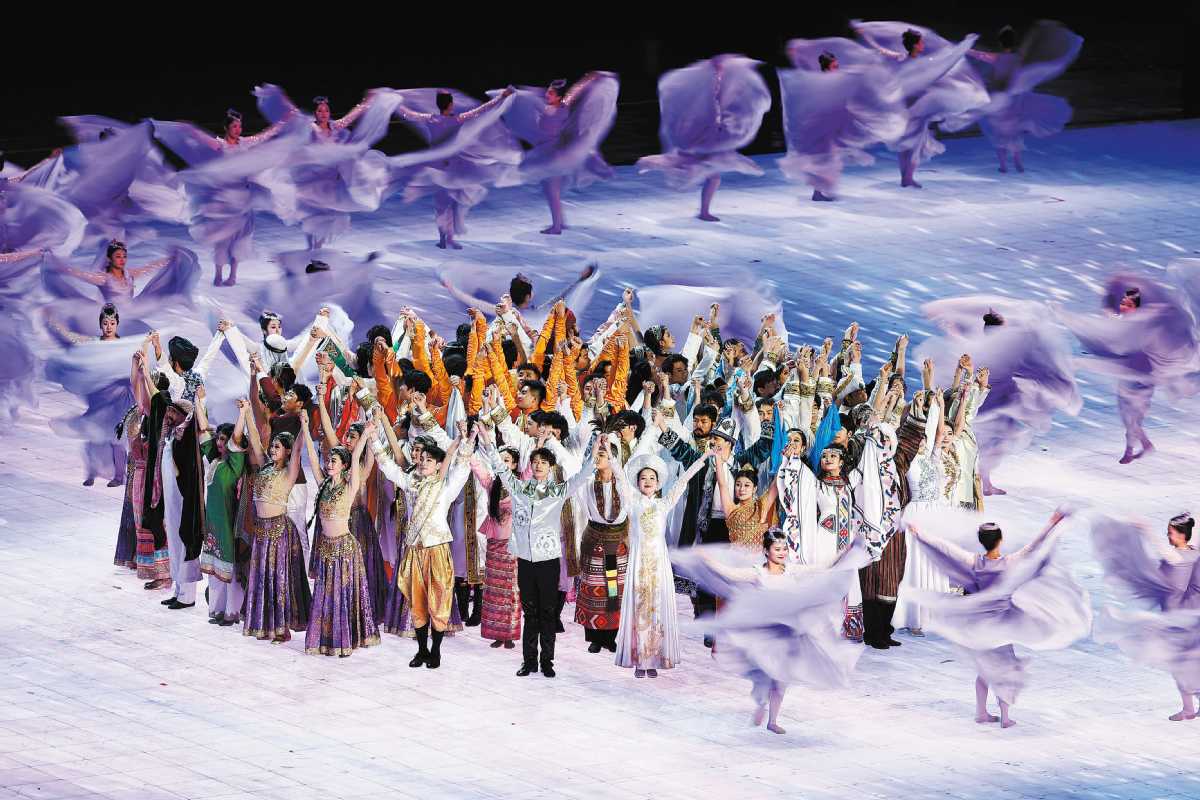
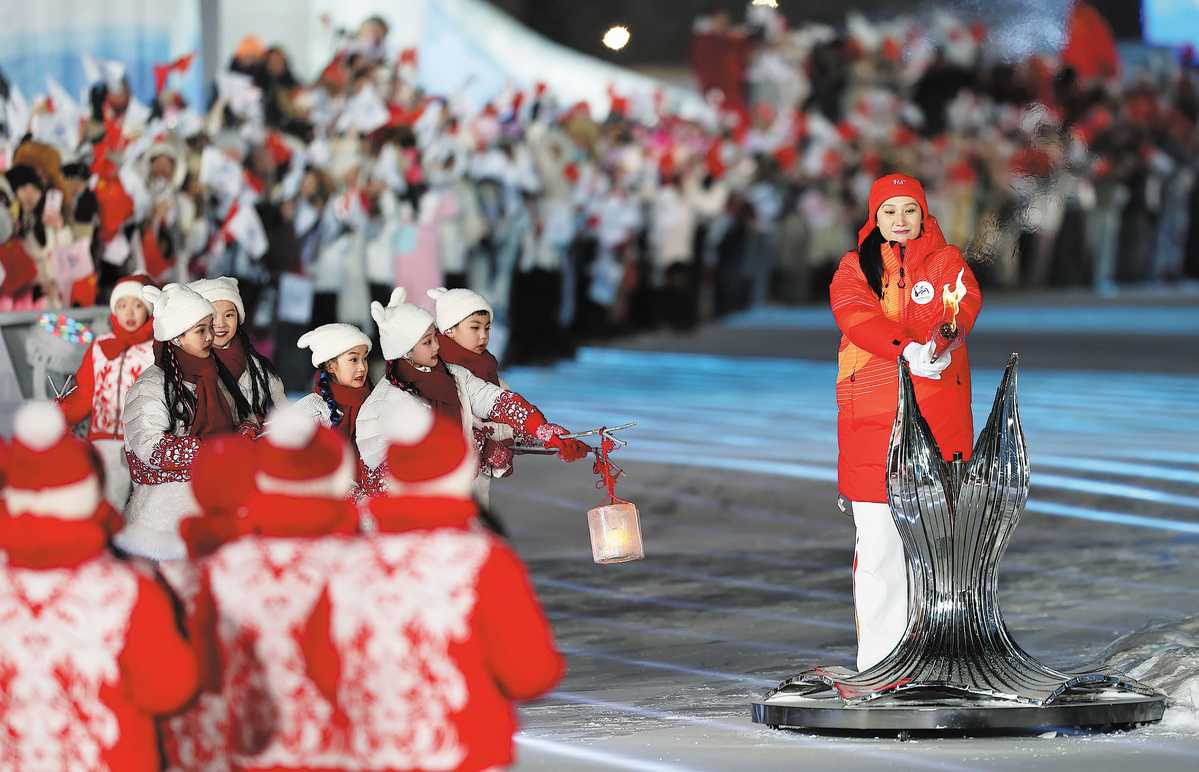
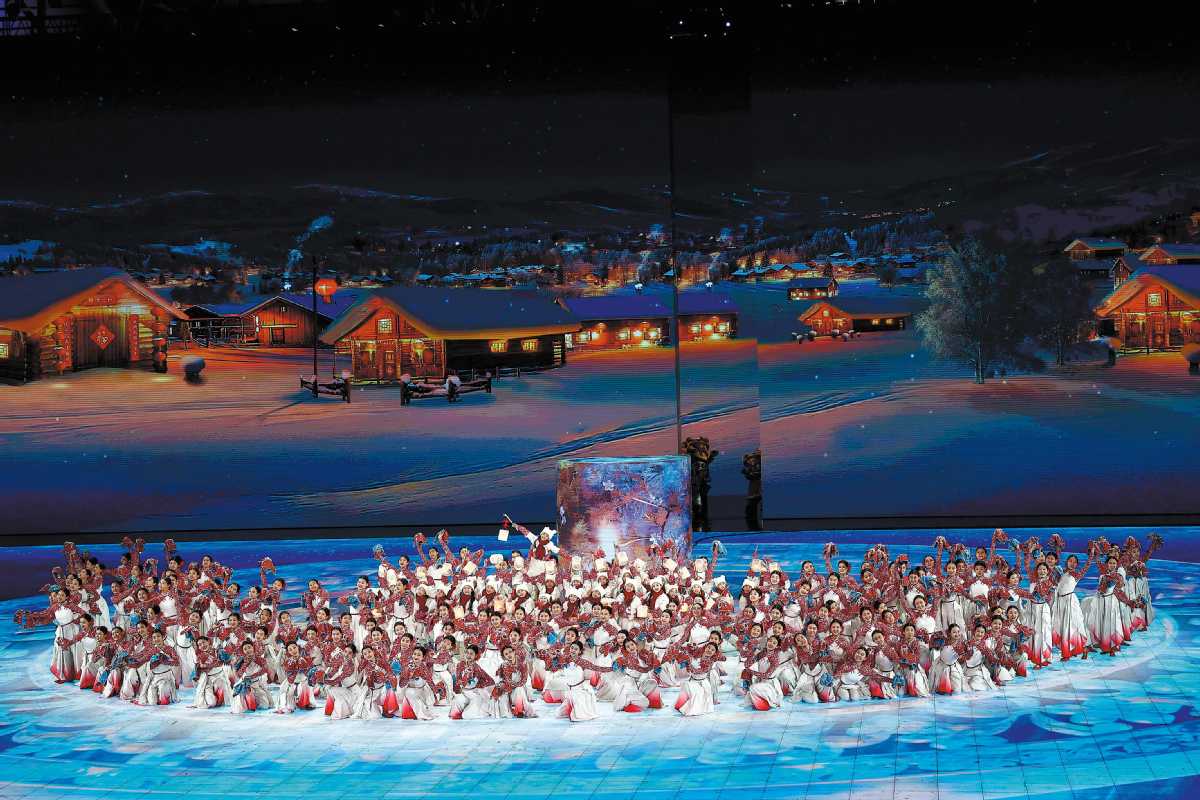
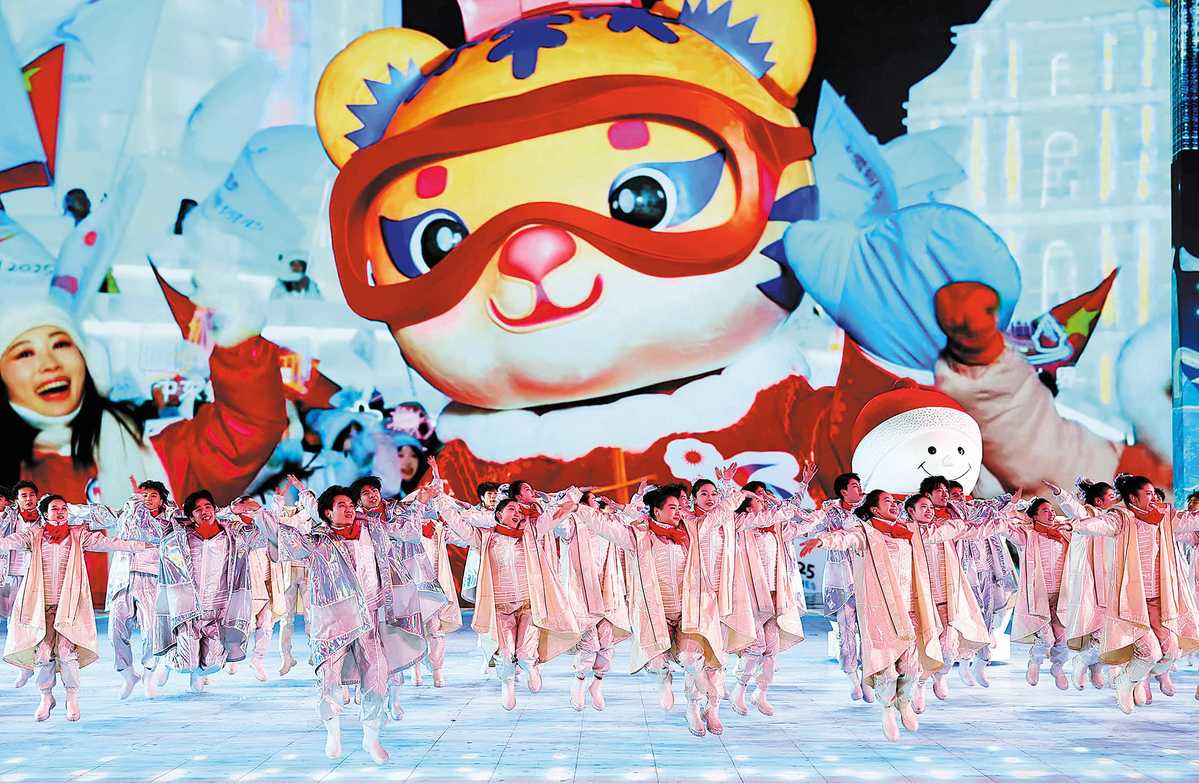
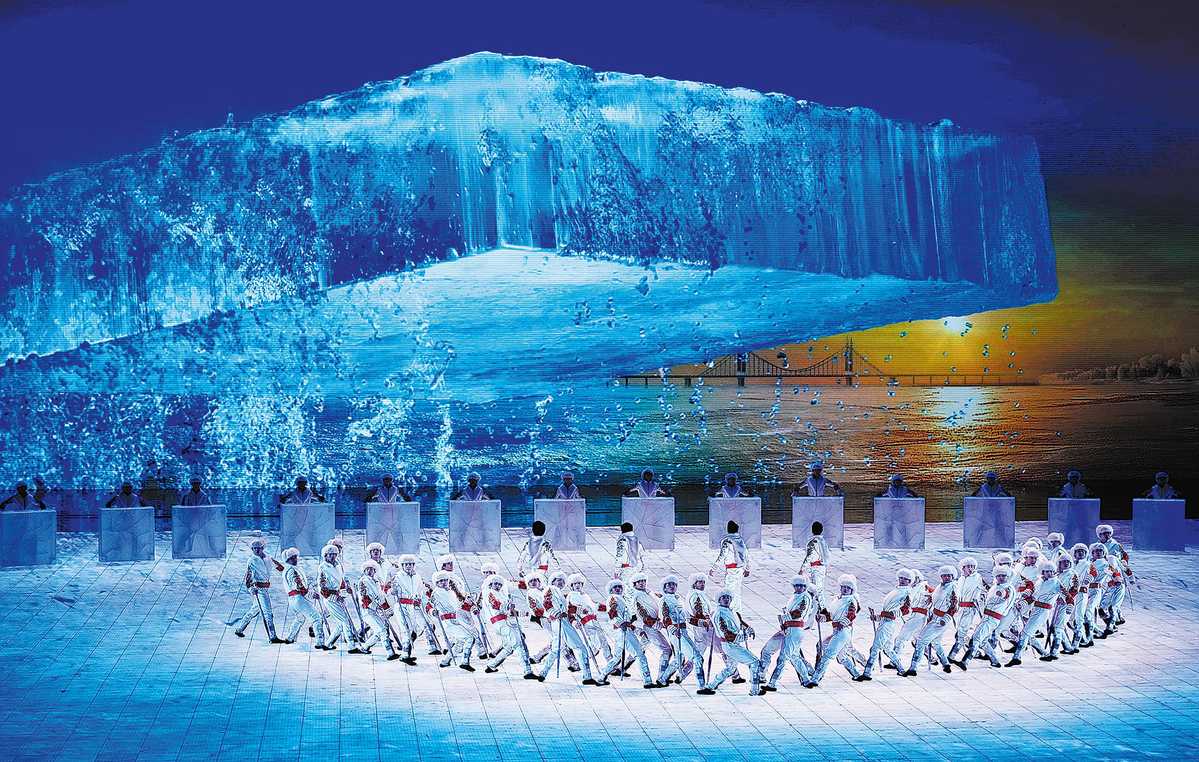
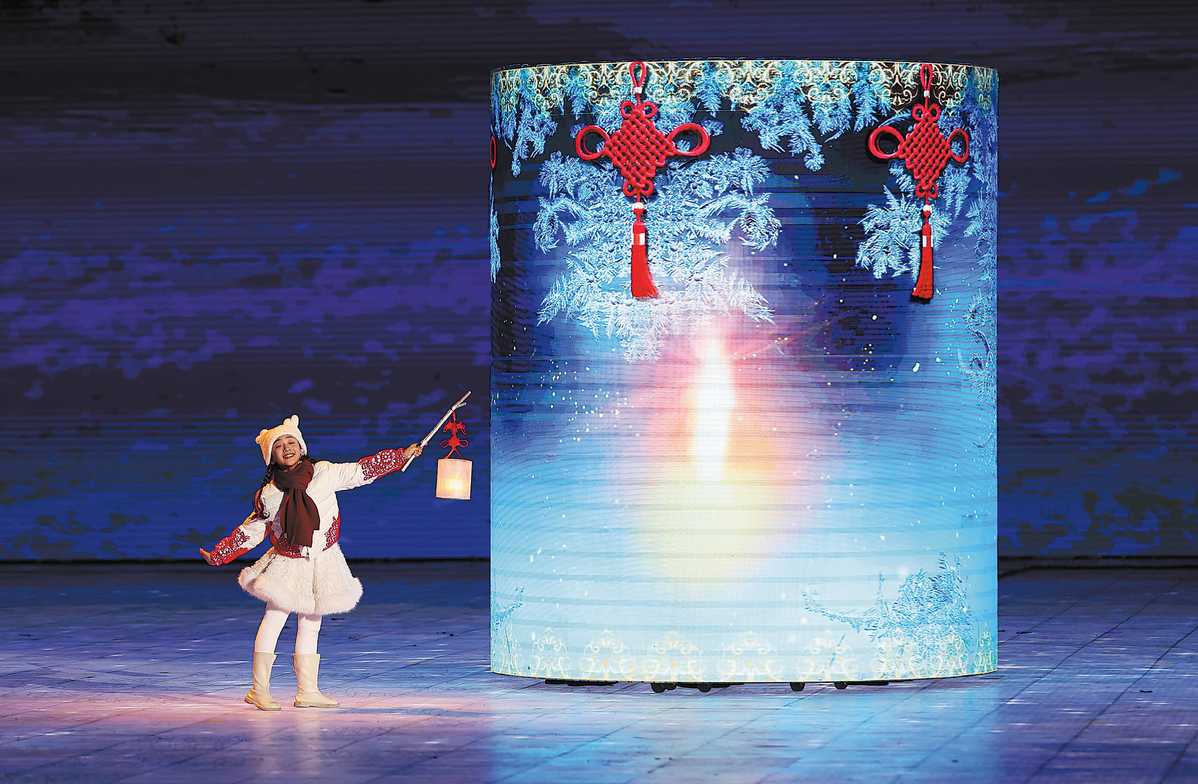
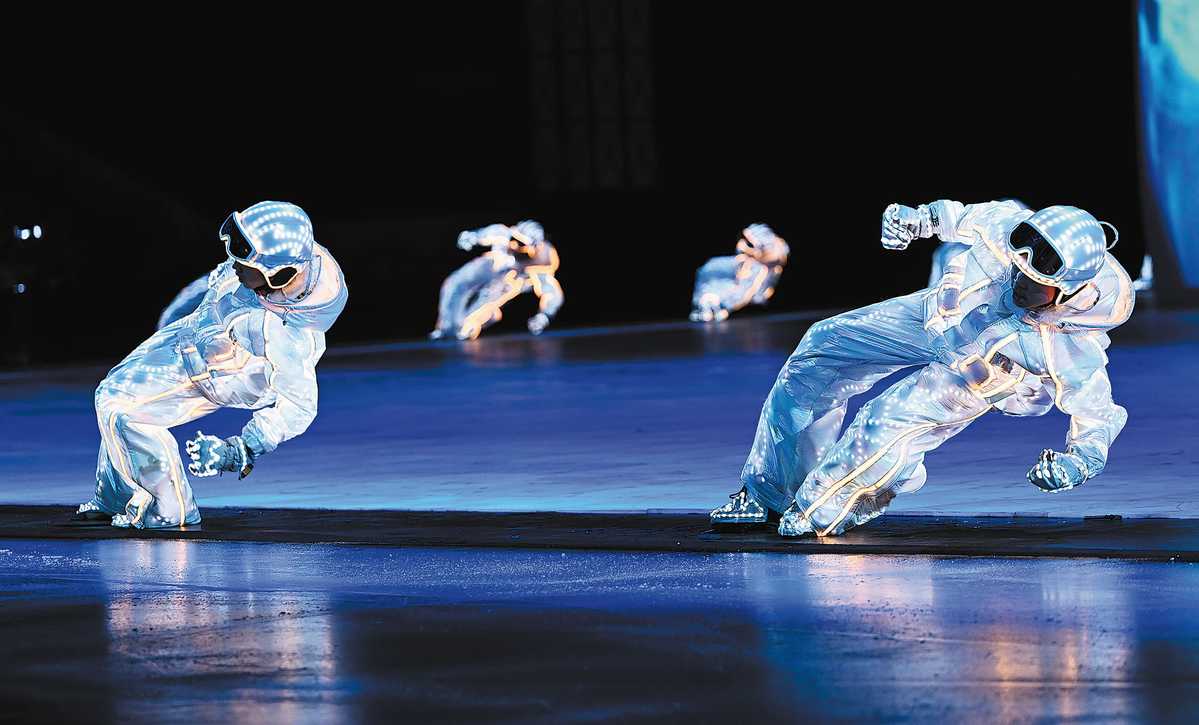
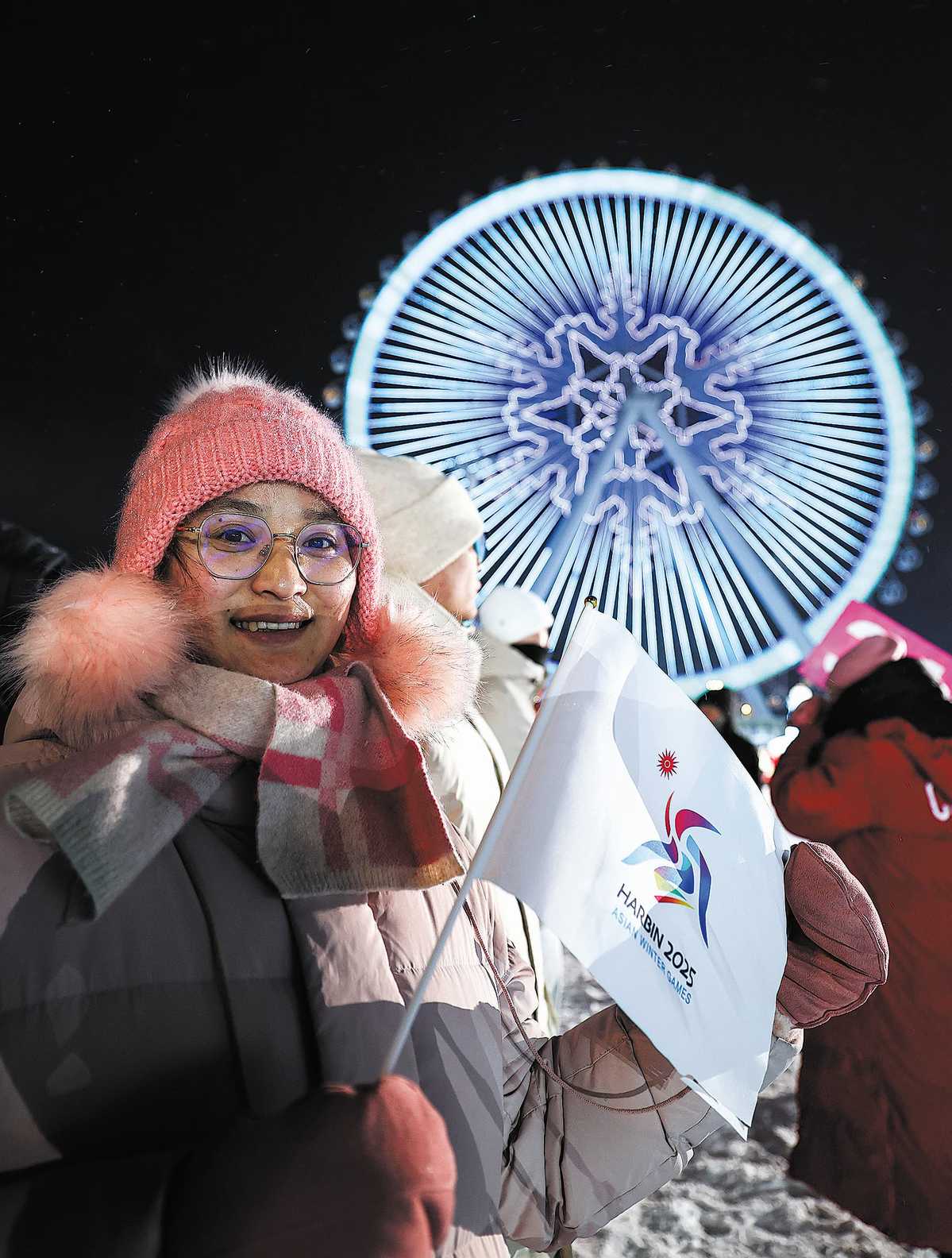
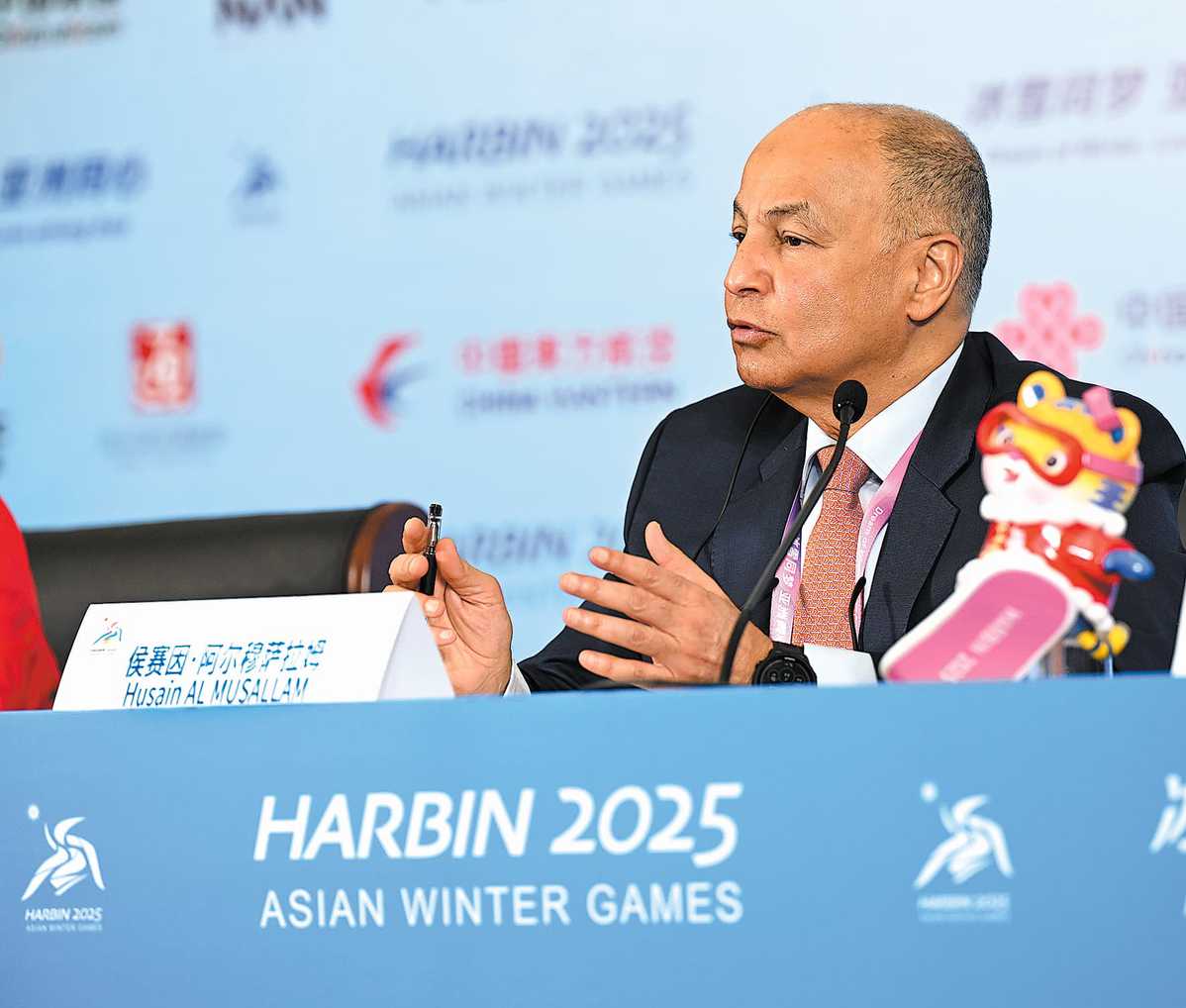
With competitions running smoothly and the opening show taking the world's breath away, Harbin 2025 has set a high benchmark for efficient event organization, as the 9th Asian Winter Games officially got underway.
Hosting a record number of 1,275 athletes from 34 countries and regions, the Heilongjiang provincial capital has pulled off an almost impossible mission by delivering the biggest-scale Winter Asiad in history on short notice, helping to reshape the landscape of ice and snow sports in Asia.
The fact that the Ice City, as Harbin is known to tourists worldwide, was given less than two years to prepare for the Games since being confirmed as host in July 2023, and still got it done on schedule and in compliance with international standards has won acclaim from across Asia.
"Harbin did a great job after taking the Games on less than two years ago," Husain Al Musallam, director-general of the Olympic Council of Asia, said during a media briefing on Thursday, the eve of the Games' opening ceremony.
"They prepared the city, they prepared the facilities and all the requirements in a very short time and in a very professional way."
Usually, host cities have at least five years to prepare for hosting a multi-sports event with a scale like the Winter Asiad.
Al Musallam applauded the efficiency and professionalism of Harbin's organizers for ensuring a level playing field for all of Asia's winter sports talent — world champions and ambitious debutants, alike — upon which to compete and unite with one another.
"We are pleased that winter sports have become very popular in Asia, from west to east and from north to south. Now, an even greater number of youths have engaged with winter sports," said Al Musallam, whose partnership with Chinese organizers dates back to the 1980s, when Beijing was preparing to stage the 1990 Asian Games.
"The Harbin Asian Winter Games will build a platform to help prepare Asian athletes to perform and compete to a high standard at the next Winter Olympics in Italy, Milano-Cortina 2026."
Since its first edition in 1986, the Winter Asiad has been held three times in China, with Harbin performing an encore following its hosting of the 1996 edition.
Changchun, in Jilin province, hosted the 6th edition in 2007.
To promote sustainability while preparing for the Games in the most efficient way, Harbin chose to stage all the 64 medal events of the Games at existing venues — five for ice sports in downtown Harbin, and another eight for snow sports events in Yabuli, a ski resort cluster located 200 kilometers to the southeast — and has taken advantage of the country's rich experience and expertise in organizing massive multi-sport events to make sure that Harbin 2025 will attain the highest standards.
According to the organizing committee, the majority of the 685 National Technical Officials (NTO) deployed in Harbin have experience from serving at the Beijing 2022 Winter Olympics.
The high quality of venue conditions, and the host's warm hospitality, have earned very positive feedback from participating athletes and officials.
Asian Skating Union President Chang Myong-hi, an esteemed sports official of the Republic of Korea, was left in awe of the standards of the Games' facilities after a visit to the Speed Skating Oval at the Heilongjiang Ice Training Center.
"I have devoted more than 60 years to ice skating. I participated in 12 Olympic Winter Games, and eight Asian Winter Games," the 93-year-old told Xinhua.
"I was here in 1996 when the Asian Winter Games was held in Harbin (for the first time). Looking at the facilities, I'm sure this is one of the finest in the world," Chang said of the oval, which was built for those Games, and has been refurbished to once again host this Asiad's speed skating competition.
An hour's train ride away from Harbin's downtown, the mountain slopes at the Yabuli resort, despite the freezing winter cold, also have athletes stoked about the competitions to come.
Muhammad Shabbir, the only Pakistani athlete to compete in cross-country skiing at Harbin 2025, said he expected his debut at the continental gala to be a memorable one.
"This is my first time competing in China, and my first time at a large-scale international competition and I feel great," he said.
"The tracks, with the snowy mountains in the background, are amazing.
"It's really cold here, but all the athletes, including myself, are showing great enthusiasm. I hope to perform well and finish as high as possible."
To help guarantee a safe experience for all participants, especially those involved in risky alpine events, the organizers have deployed over 600 medical personnel, including first-aid professionals who can ski and speak English, at all the venues.
Treatment and medical services have been prepared at 31 designated hospitals across the city.
"I have found all the preparations for the athletes, as well as spectators, have been carried out to the highest standards. I trust the healthcare system in the city to ensure every participant is in safe hands," said Dr Sultan Al Busaidi, chair of the OCA's medical committee.
"In terms of anti-doping, the China Anti-Doping Agency and International Testing Agency have prepared all the formalities."
Contact the writer at sunxiaochen@chinadaily.com.cn
The ice conditions at the Heilongjiang Ice Training Center have been hailed as "high quality" by experts from home and abroad.
"The ice is perfect for short-track speed skaters to achieve great results," said Xu Xun, a technical representative from the Asian Skating Union.
He noted that the ice temperature, indoor temperature and humidity all meet international standards, allowing athletes to perform at their peak.
Xu, working alongside Kim So-hee of the Republic of Korea, a technical representative appointed by the International Skating Union (ISU), emphasized the meticulous preparations for the competition.
"Our main responsibility is to ensure that all technical requirements for short-track speed skating are met, including the ice conditions, venue facilities, athletes' lounges and mixed zones. We'll fully record the relevant data and check everything," Xu said.
Harbin has a long history of hosting top-tier skating events, with its ice-making team boasting more than 40 years of experience. The team has worked on major international competitions, including the World Cup and World Championships.
According to Yu Jinqiao, who has maintained ice rinks since 2009, the ice surface at the Heilongjiang Ice Training Center is kept between — 6 C and — 7 C, with a thickness of 3.7 centimeters. The indoor temperature remains around 15 C, and humidity is maintained at 35 percent — all in line with ISU standards.
"Our team resurfaces the rink multiple times a day using triple-filtered purified water, and each resurfacing takes around 20 minutes," Yu said. He added that, unlike traditionally fuelled machines, the event is using electric ice resurfacers for a more eco-friendly approach.
With the competition already underway, teams from the ROK, Kazakhstan, India, and China were well-prepared after training at the venue.
"Many athletes tell us that the ice is perfect," Yu said.
Kazakhstan's short-track speed skating team, consisting of six athletes, were at the Center several days before the Games started.
"The rink is very good, and the ice is of high quality and fast. I think the athletes will achieve good results," said Petr Gamidov, head coach of Kazakhstan's short-track speed skating team.
"Our goals are, of course, medals, and we hope the athletes will have an intense and fair competition," Gamidov added.
Park Ji-won, a gold medal favorite on the ROK team, told Maeil Business Newspaper that he felt comfortable on the ice.
"I think the ice suits me well. I believe I have a better control and understanding of the ice than anyone else. I don't worry much about the ice, because I believe in myself," Park said.
With short-track speed skating involving aggressive, high-speed racing, ice quality is critical.
"During the relays, up to 20 athletes can be racing on the rink at the same time, which can damage the ice surface," Xu said. "Therefore, technical representatives will ensure that referees inspect the surface before every race to maintain competition fairness."
The short-track speed skating program got underway Friday morning and will finish on Sunday.
XINHUA
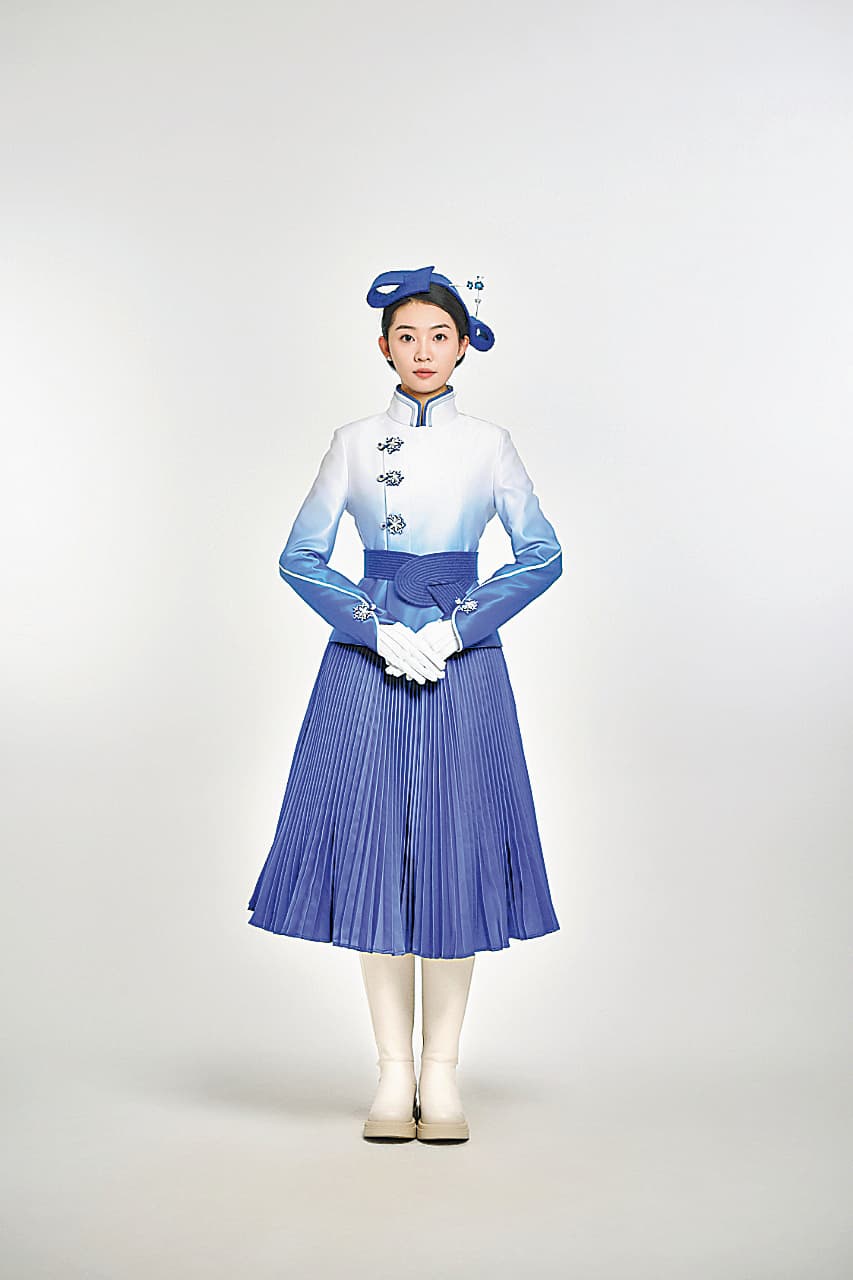
Traditional Chinese cultural elements and aesthetics are subtly stitched into the ceremonial dresses and officials' attire at the 9th Asian Winter Games in Harbin, demonstrating the city's unique features while sending out best wishes for participants.
Donghua University in Shanghai was tasked with designing the outfits. Three teachers and eight students from the university's College of Fashion and Design have been immersed in the project since July.
Together with their production partners, they have managed to submit over 20 designs for approval and produce over 1,900 outfits for technical officials and Olympic Council of Asia (OCA) officials, 116 sets of ceremonial dresses and thousands of accessories, including silk scarfs and neckties.
"We have come up with about 40 designs in total, 20 of which were eventually confirmed. The Asian Winter Games are not only a sports gala, but also a big cultural gathering," said Ni Jun, one of the leaders of the design team and a professor at the College of Fashion and Design at Donghua University.
"We would like to showcase our traditional Chinese culture in the design of the outfits, which integrate Shanghai-style elements and craftsmanship."
Among all the designs, the blue ceremonial attire is particularly eye-catching.
Inspired by the ice and snow of Harbin, dubbed the Ice City, the dress embodies the exquisite combination of traditional Chinese culture and modern tailoring techniques.
According to the design team, the blue color symbolizes purity, nobility, trust and reliability, representing the sky, sea and glaciers, as well as enduring friendship and faith, which is in line with the spirit of sports.
Moreover, Ni explained that the wavy hair ornament takes inspiration from Chinese scrolls, and the hair pin inheriting the ancient Chinese design presents a unique dynamism when its wearer is walking.
The skirt swings smoothly with each step, and the upper part of the dress is a reimagined qipao, decorated with a Shanghai-style waistband featuring cloud patterns and handmade snowflake-shaped Chinese knot buttons.
In addition to the designs, the production of the garments was also a test for the team.
For instance, the officials' attire is made of top-level wool fabrics that provide good warmth, comfort and breathability.
However, such fabrics are extremely light and soft, which is challenging for shaping and production. Besides, the design also has to have the flexibility to accommodate the different body shapes and sizes of some 1,900 officials.
"We have been supported so much by the factories across the nation that cooperate with our university," Ni explained.
"They are equipped with advanced technologies and, as we demanded, have a sustainable and environmentally friendly production process.
"Producing one set of the officials' attire involves around 396 procedures. It would not be possible for us to complete the task and promptly respond to urgent adjustments without their support and expertise," Ni added.
Leading a team of 20 people, Ni is now busy serving the Asian Winter Games participants on-site in Harbin.
"It is going well so far, there have been a few demands for adjustments.
"I feel moved when I see our team united and get really wrapped up in our work to accomplish the task.
"It is a great honor for us as a group, and for Donghua University to be part of this sports gala," said Ni with a smile.
wangxin2@chinadaily.com.cn

HARBIN - As the night sky over Harbin glows with the lights of the Asian Winter Games opening ceremony, 20-year-old Liu Mengting will take center stage - not on the slopes where she usually soars, but at the helm of Team China, leading her fellow athletes into the spotlight as the host country's flagbearer.
For Liu, a rising star in freestyle skiing, the honor came as a surprise. "I never expected it," she said. "There are so many great athletes on this team and many are more experienced than me. But when I found it out, I was beyond excited - it's a recognition that means so much."
That recognition was well-earned. In January, she claimed her first FIS Freeski World Cup title in the women's big air event in Klagenfurt, Austria. "Winning that competition wasn't just personal - it was a testament to my team, my years of training and the journey that brought me here."
Her journey began a decade ago, when she switched to skiing from gymnastics and discovered a love for the sport that would shape her life.
As she prepares to compete in the Big Air and slopestyle events at the Asian Winter Games, she sees carrying the flag as more than just an honor - it is a responsibility.
"There is pressure, of course, but it's also a great motivation," Liu said. "I want to show people the charm of winter sports and inspire more people to try it themselves."
Liu has prepared for her maiden show at the Asian Winter Games for a long time. "I have competed in multiple events this season to get ready for this moment, and now I'm in good form. My goal is to perform at my best and, hopefully, I can stand on the podium for China," she noted.
Like many Chinese winter sports athletes, competing at the 2022 Beijing Winter Olympics was once a dream for Liu. However, with limited preparation time and a gap in skill level, she was not qualified. Still, the event became a source of inspiration.
"Watching my predecessors and seeing their dedication and success gave me a sense of purpose," Liu said. "And I hope I can carry on that spirit and continue to promote winter sports."
During her spare time, Liu always goes skiing in public ski resorts, enjoying the slopes alongside everyday skiers. "It's also a motivation to see that after the Beijing Winter Olympics, more and more people are hitting the snow, and their enthusiasm makes me so happy."
Beyond the Asian Winter Games, Liu has already set her sights on the Milan-Cortina 2026 Olympic Winter Games. "I have a goal in mind, and I'll keep moving forward step by step to achieve it," she said.
Tonight, as she strides into the stadium with China's flag, Liu will not just be leading a delegation - she will be carrying a dream, one that has just begun.

HARBIN - Soft snow fell gently over Harbin the evening of February 6, blanketing the city in white. However, inside the ice hockey stadium for the Asian Winter Games, the atmosphere was anything but cold.
The women's Group B match between Chinese Taipei and Kazakhstan kept fans on the edge of their seats. Just five minutes into the match, Chinese Taipei made its mark as 18-year-old Wu Ji-Cih scored the opening goal, celebrating with her teammates in a triumphant display.
Scoring against Asia's top team, Wu is quickly making a name for herself. With two goals at the Games so far, the college freshman leads her team in scoring.
"I'm just happy I could work with my teammates to score a goal," Wu said modestly after the match, her helmet removed to reveal damp, sweat-soaked hair.
Unlike most of her teammates who live and train in Taipei, Wu hails from Tainan. Every Friday night, she boards a high-speed train alone to travel north for practice, returning the next day.

"I have to stay focused in class because I don't have the energy to study after practice," she admitted. "When I get home, I just sleep. A lot."
Despite her dedication, Wu is limited to just 75 minutes of on-ice training per week due to the lack of facilities. "Taipei has only one ice rink up to competition standards, which is shared among ice hockey, speed skating, and figure skating programs," she explained.
More remarkably, Wu only stepped onto the ice two years ago. A former roller skater, she was discovered by the Chinese Taipei U18 women's ice hockey coach. Transitioning from roller skates to ice blades was a challenging journey.
"I just kept falling," she recalled. "At first, I was afraid to brake, and making sharp turns was difficult. But my teammates encouraged me, helping me improve gradually."
With barely a hundred on-ice training sessions under her belt, Wu is already emerging as a rising star. "It's all thanks to my teammates," she added with a shy smile.
Wu has visited the Chinese mainland numerous times for roller skating exchanges and competitions, particularly in Guangzhou. Looking ahead, she hopes to move to the mainland after graduation to teach either roller skating or ice hockey.
"Why?" she laughed. "Because the food is amazing."
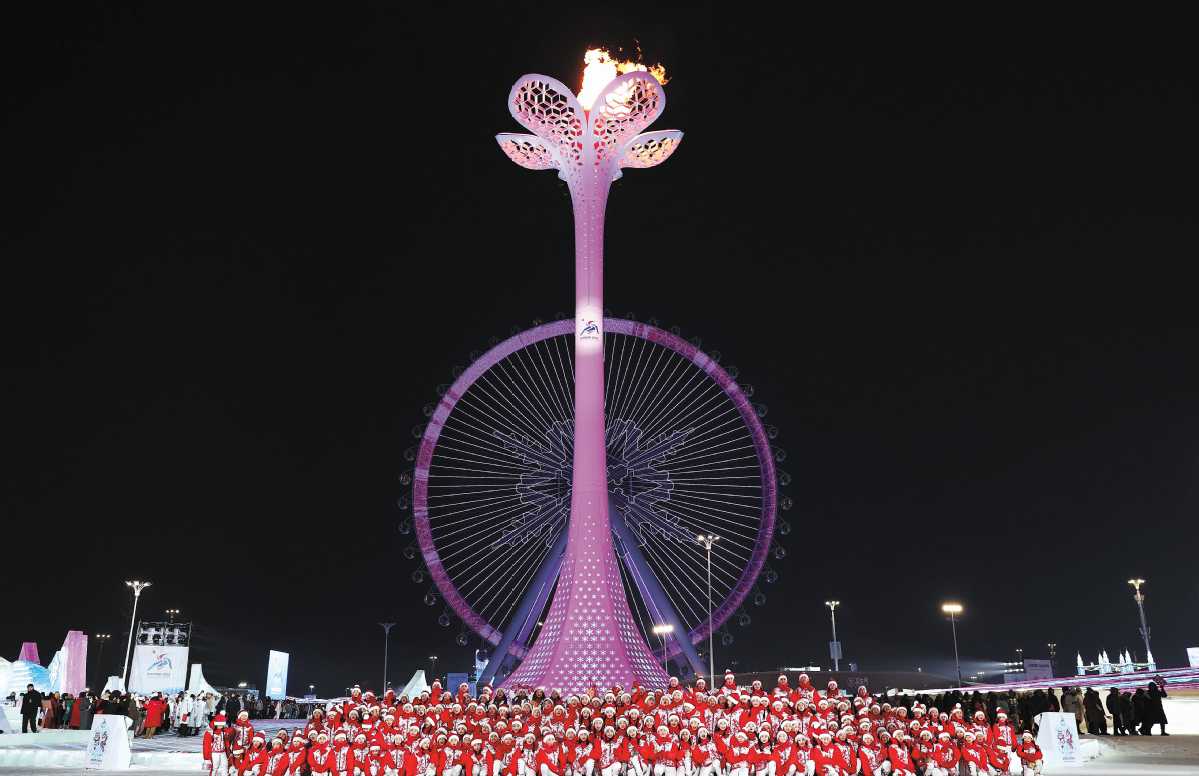
Featuring an extensive display of local culture and a high-tech visual feast, a spectacular gala show captured the imagination of the continent on Friday night, as President Xi Jinping declared the 9th Asian Winter Games in Harbin open.
Almost three decades after hosting the multi-sports event for the first time, the provincial capital of Heilongjiang province kicked off a bigger and better encore to the 1996 edition by promising to set a higher standard and provide a more inclusive stage for Asia's winter sports talent to compete, while sharing friendship in Northeast China's popular winter wonderland.
Following an opening performance, which saw 34 children, representing the Games' 34 delegations, light a giant ice lantern together in a gesture of Asian unity, Xi announced the opening of the Games, officially kicking off the biggest Winter Asiad ever.
A record 1,275 athletes will contest in 64 medal events across six sports — skating, ice hockey, curling, skiing, biathlon and ski mountaineering.
Accompanying the announcement, digital fireworks thrilled the 8,000 spectators at the Harbin International Conference, Exhibition and Sports Center, while real firecrackers sparkled in the sky above the Harbin Ice and Snow World, where opening ceremony festivities were also taking place.
With the giant floor screen lighting the way, the athletes' parade proceeded to the melody of Ice, Snow and Asia, played to the inspiring beat of traditional instruments from across the continent, as each delegation marched onto the stage under glittering clouds of silver snowflakes hanging from the ceiling.
During the parade, images of Harbin's mountains and rivers, its iconic ice sculptures and the city flower — the lilac — were projected onto the background screen, allowing visiting athletes and spectators to enjoy the host's unique characteristics in an immersive way.
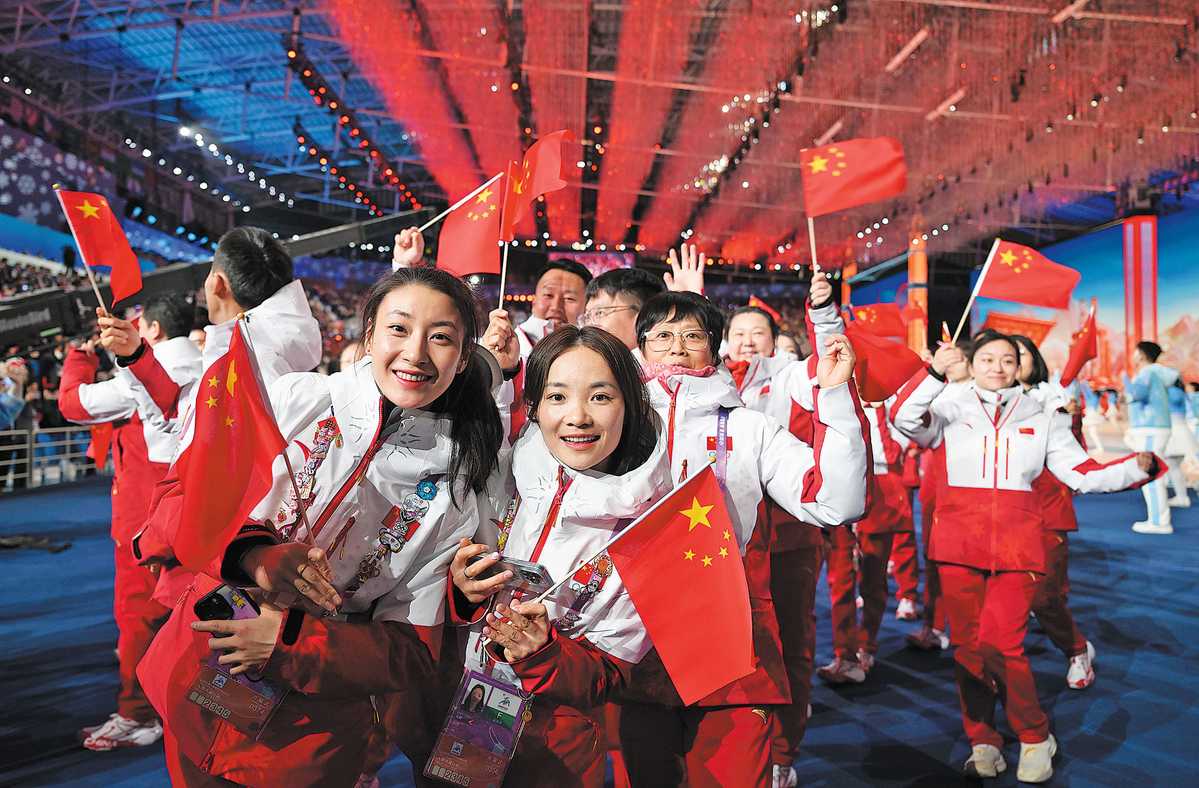
Liang Huiling, president of the 9th Asian Winter Games Harbin Organizing Committee, extended a warm welcome to visiting athletes and delegation officials, taking pride in reuniting Asia's best winter sports talent in Harbin.
"Twenty-nine years ago, the flame of the Asian Winter Games ignited this city's passion and dream for ice and snow.
"Today, we are here to jointly witness Harbin become a dual-Winter Asiad city, a continuation of the Beijing 2022 Winter Olympics' legacy, which has promoted winter sports among 300 million Chinese people," said Liang, who is also governor of Heilongjiang province.
A three-chapter artistic performance, enhanced by technologies such as virtual reality and glasses-free 3D animations, captured the crowd's imagination with breathtaking projections depicting traditional Harbin rituals, such as ice harvesting from the frozen Songhua River, and the city's fairy-tale winter scenes of frost-covered branches glistening amid flurries of swirling snowflakes.
Suited up in costumes adorned with breathtaking lighting effects, performers on roller skates and junior athletes skating on a real ice track glided onto the stage to demonstrate the enthusiastic participation in winter sports in Harbin, a renowned training base for China's ice and snow sports talent.
After watching another international winter sports gala open in China, International Olympic Committee president Thomas Bach, who also attended the opening of the Beijing 2022 Winter Olympics, said the Harbin event would likely exceed expectations.
"Knowing the expertise of the people of Harbin and of China in organizing great sporting events, the expectations are very high. As I know, China will exceed even these high expectations," he told Xinhua before the ceremony.
Impressed by the expansion of winter sports across Asia, Bach hailed the impact of Beijing 2022 and Harbin 2025 as a game-changer for ice and snow sports worldwide.
"These Games are part of the legacy (of Beijing 2022) and the development of winter sports in China is just breathtaking," said the German sports administrator, who will step down from his position at the IOC when his second term expires next month.
"You could see winter sports athletes from Qatar, Kuwait and Saudi Arabia (in Harbin). And in these countries, this excitement for winter sports is growing. This is how it should be, benefiting from this great legacy of Beijing 2022."
For the exciting finale, a group of skating children holding ice lanterns at Harbin Ice and Snow World journeyed to the center of the theme park to jointly ignite the Games' cauldron with the final torchbearer Zhang Hong, China's first speed skating Olympic champion at Sochi 2014.
The glow of the lanterns and the flame of the Winter Asiad lit up the freezing night in Harbin, as the cauldron, named "Bloom of the Ice Lilac", ignited in spectacular fashion and filled the Ice City with warmth.
Editor's note: President Xi Jinping on Friday held two separate meetings with international dignitaries attending the opening ceremony of the 9th Asian Winter Games in Harbin, Heilongjiang province.
China calls for consolidating strategic partnership with ROK
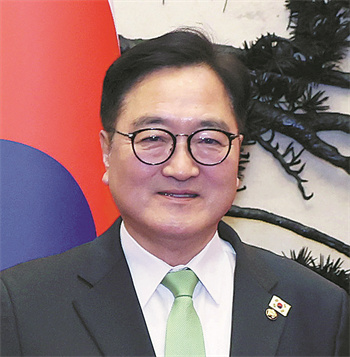
President Xi Jinping called on China and the Republic of Korea to work together to consolidate and advance their strategic cooperative partnership as he met with the National Assembly Speaker of the ROK Woo Won-shik on Friday.
Noting that China's policy toward the ROK remains stable, Xi said bilateral ties have continued to grow over the past 30 years, promoting cooperation and contributing to regional peace and development.
As this year marks the 80th anniversary of the victory of the Chinese People's War of Resistance Against Japanese Aggression (1931-45) as well as the 80th anniversary of the ROK's National Liberation Day, Xi said both countries should well organize commemorative activities.
He underlined the need to deepen mutually integrated and win-win economic and trade relations, which conforms to the common interests of both peoples.
Xi also urged the two sides to enhance cultural exchanges and strengthen friendship between the peoples.
Noting that the ROK and China will respectively host the Asia-Pacific Economic Cooperation Economic Leaders' Meeting this year and next, the Chinese president called for mutual support for each other in hosting the event.
Woo said bilateral cooperation has played a significant role in the respective development of the two countries, adding that Seoul is ready to make concerted efforts with Beijing to elevate their bilateral relationship.
He pledged that friendship with China is one of the core tenets of the country's foreign policy, and will not change.
Woo added that he hoped that the two countries could beef up economic and trade cooperation, maintain the stability of global industrial and supply chains, expand personnel exchanges, and jointly commemorate the 80th anniversary of the victory of the World Anti-Fascist War.
He also expressed hope that the two sides will support each other in hosting the APEC Economic Leaders' Meeting.
zhaojia@chinadaily.com.cn
Beijing will continue to work with IOC to advance Olympic movement
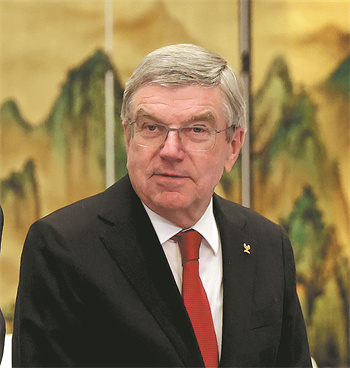
President Xi Jinping underscored on Friday the importance of the Olympic spirit for human civilization, saying that China will integrate this spirit with the country's traditional culture and vigorously boost its sports to make greater contributions to the cause of international sports.
Xi made the remarks when meeting with International Olympic Committee President Thomas Bach.
Being an old friend of the Chinese people, Bach visited China shortly after he took office as IOC president in 2013. He has visited China a number of times to attend major sporting events such as the Nanjing 2014 Youth Olympic Games, the 2022 Beijing Winter Olympics and the Hangzhou Asian Games in 2023.
Noting that China's successful hosting of these sporting events is inseparable from its close collaboration with the international body, Xi told the IOC chief that China will continue to work with the committee to advance the Olympic movement.
Bach appreciates China's longstanding support for the IOC and said that China's hosting of spectacular and unforgettable sporting events like the Beijing Winter Games had made significant contributions to the international Olympic movement.
He also spoke positively of China's efforts in advocating solidarity, cooperation, equality and respect, in upholding multilateralism, in opposing the politicization of sports, and in supporting developing countries to be more widely involved in international sports.
China has played an important role in promoting the healthy development of the Olympic movement, he said.
Bach expressed his belief that China will continue to achieve greater development accomplishments and make greater contributions to world peace, prosperity and progress.
mojingxi@chinadaily.com.cn
Before leaving for Harbin, the capital of Heilongjiang province, Thai Prime Minister Paetongtarn Shinawatra told China Daily in Beijing on Thursday that although it will be her first time to participate in the Asian Winter Games, she's no stranger to the host city.
"It is going to be my third time visiting Harbin," she said ahead of the official opening on Friday of the 9th Asian Winter Games, which will run through Feb 14.
The trip to China's "Ice City" is part of Paetongtarn's packed schedule during her first official visit to China as prime minister. The visit is scheduled to conclude on Saturday.
This year marks the 50th anniversary of the two countries' establishment of diplomatic relations. Annual bilateral trade rose 6.1 percent year-on-year in 2024 to reach $133.98 billion, according to figures from China's General Administration of Customs.
Collaboration on infrastructure and emerging sectors has been high on Paetongtarn's agenda during her trip to China. On Tuesday, before the visit, Thailand's Cabinet approved the second phase of the high-speed rail project that will connect Thailand and China through Laos.
"I think we can get a lot of benefits out of this in the near future, from Thailand to China and to Laos as well," she said.
Citing the future trains' potential push for the commodities trade, Paetongtarn said the project "not only can create more income for the people, but, of course, the relationship between both countries (China and Thailand) is going to be better as well".
Regarding bilateral cooperation in cracking down on online gambling and telecommunications scams, Paetongtarn said she takes the safety of Chinese citizens in Thailand seriously and has personally looked into the aspects of security.
In the interview, she said Thailand has already taken very strong action on this issue, "so I think this is a very good start to prevent all the scams that really, really hurt people".
Noting that Thai people have also been greatly affected by the scams, she said her country has had very good cooperation with China, and "we hope that we can do more together".
"We have a group of people from both countries talking about all the problems that we both have," she added. "I think that is a very good way of finding solutions together."
zhangyunbi@chinadaily.com.cn
